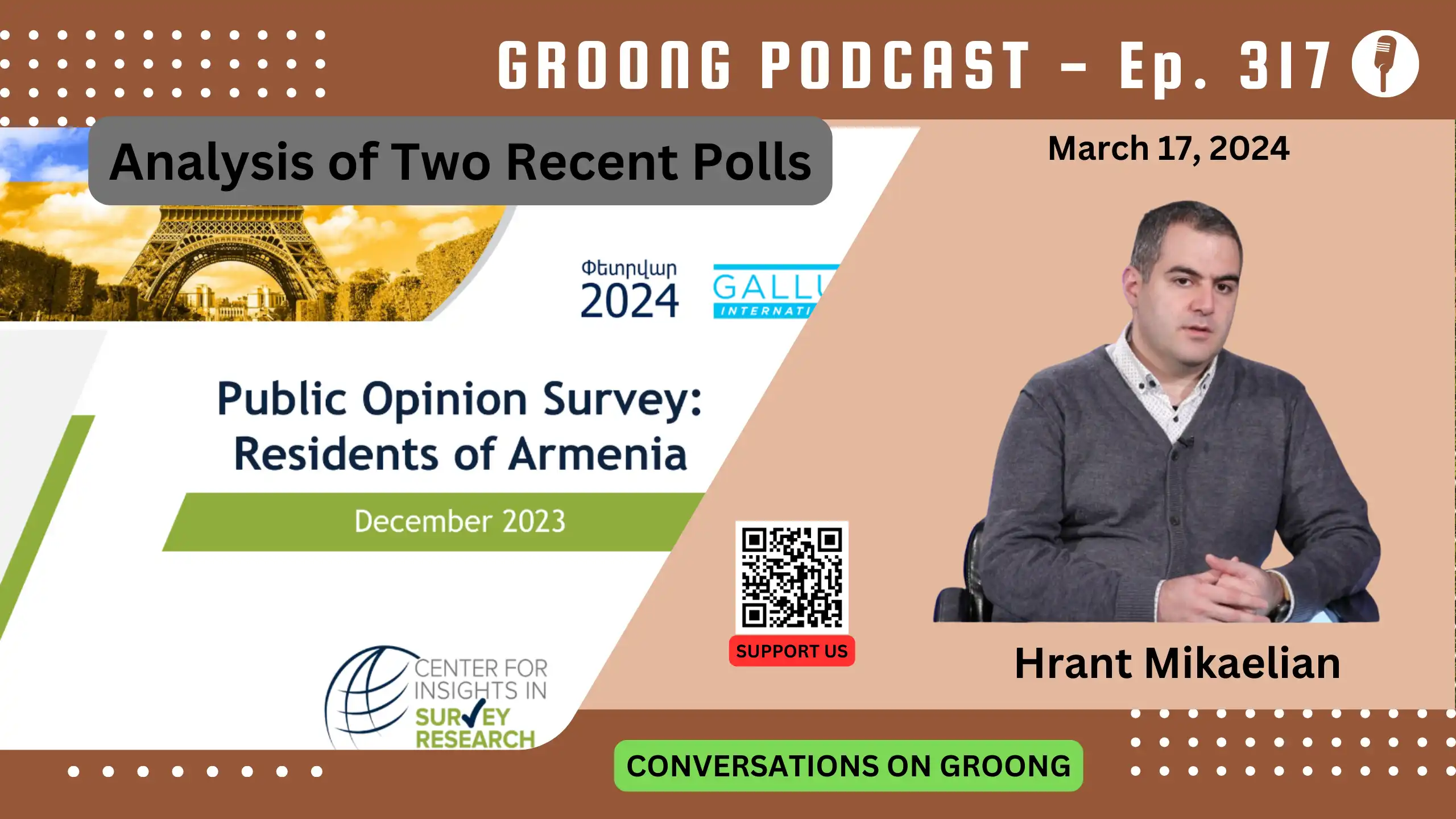
Groong Links:
Topics:
- IRI Poll, December 2023
- MPG Poll, February 2024
Guest:
Topics:
Episode 317 | Recorded: March 16, 2024
Show Notes
MPG and IRI Poll Results
IRI Poll
So the International Republican Institute poll, which was released last week, was actually conducted just before Christmas 2023. It polled over 1,500 residents of Armenia and had a response rate of 28%, with an estimated margin error of plus or minus 2.5%.
And maybe the responses incorporate the good feelings and optimism of the holiday season, who knows.
If you’d like to see the poll slides that we’re going to discuss, you can follow our show on our Youtube channel, where we will put the slides in our video. We’ll also put them in our world-famous show notes, at podcasts.groong.org.
Slide 5: Is Armenia heading in the right direction or the wrong direction?
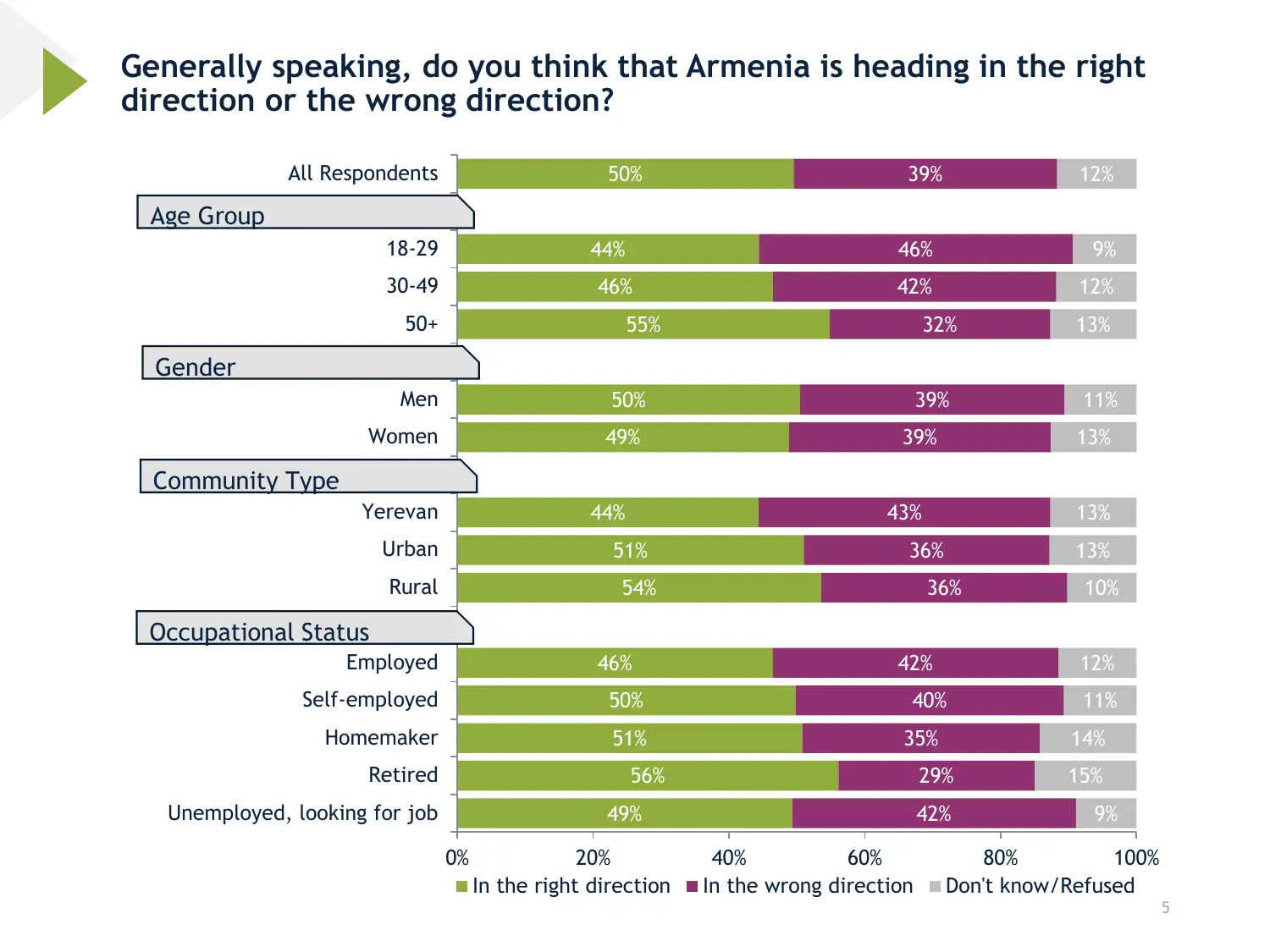
Generally it seems like people are polarized over this question, slightly favoring “right direction” over “wrong direction”.
Questions:
- What are your thoughts about how respondents have assessed this?
Slide 8: What are the main problems Armenia is currently facing?
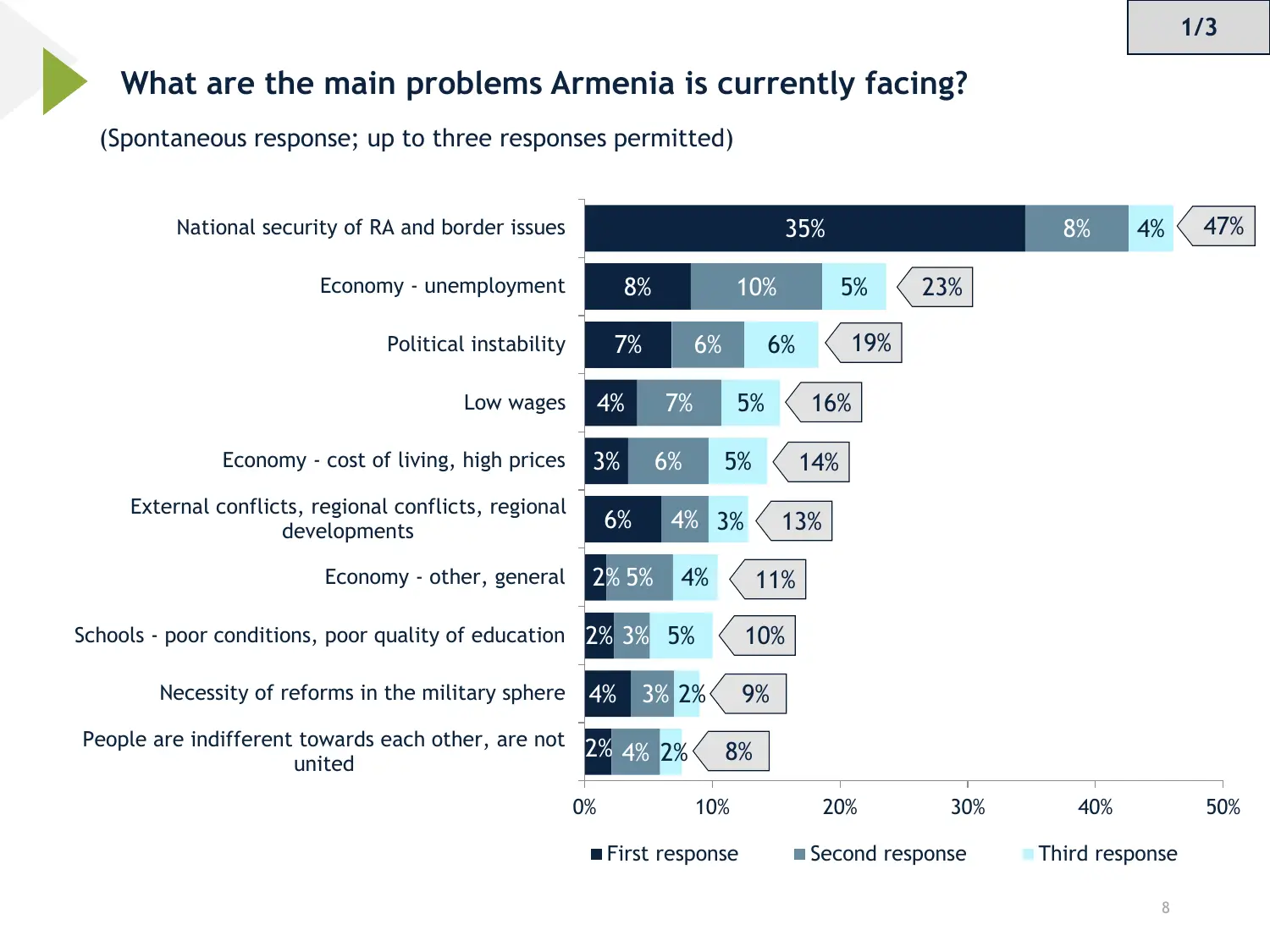
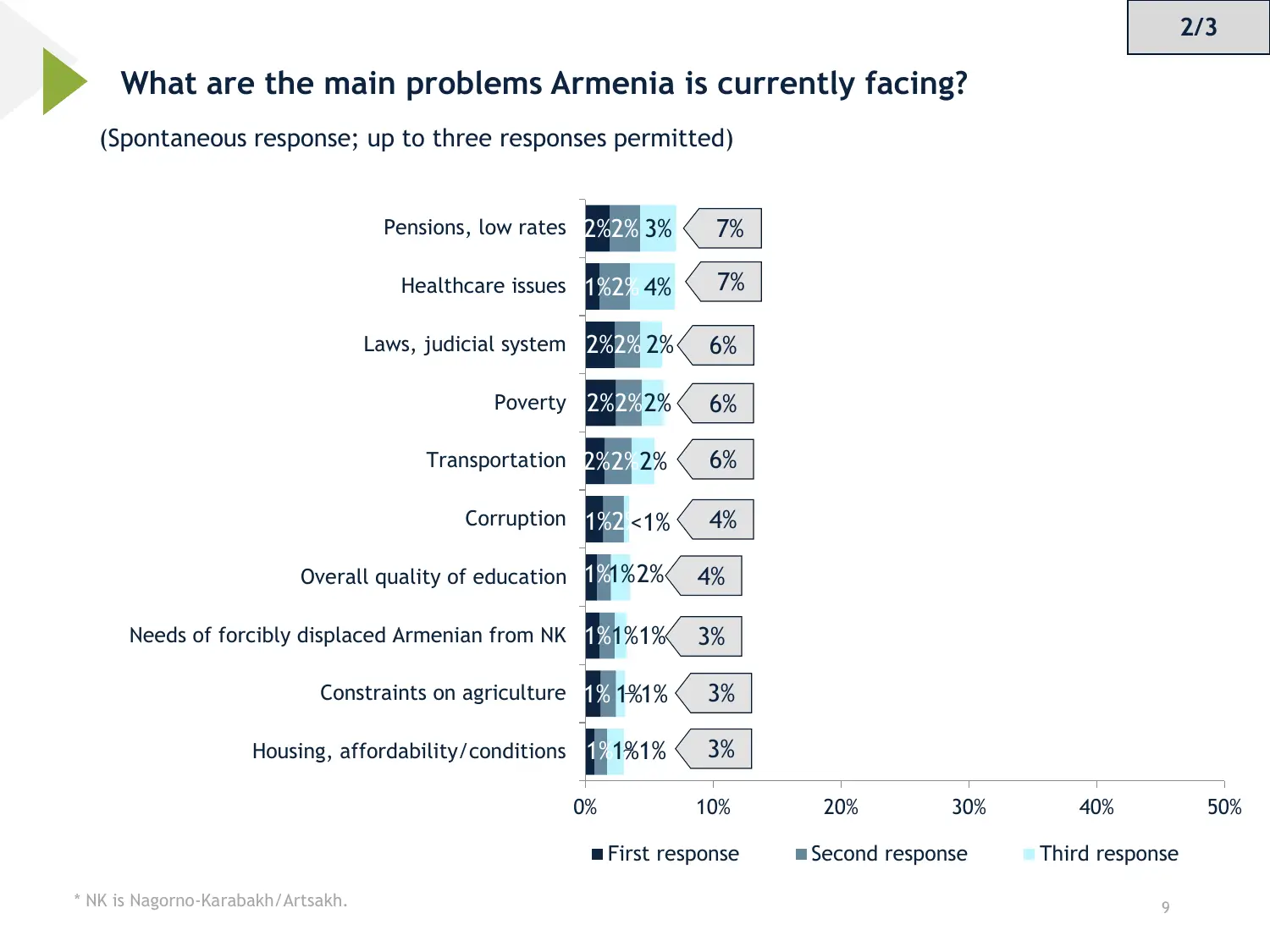
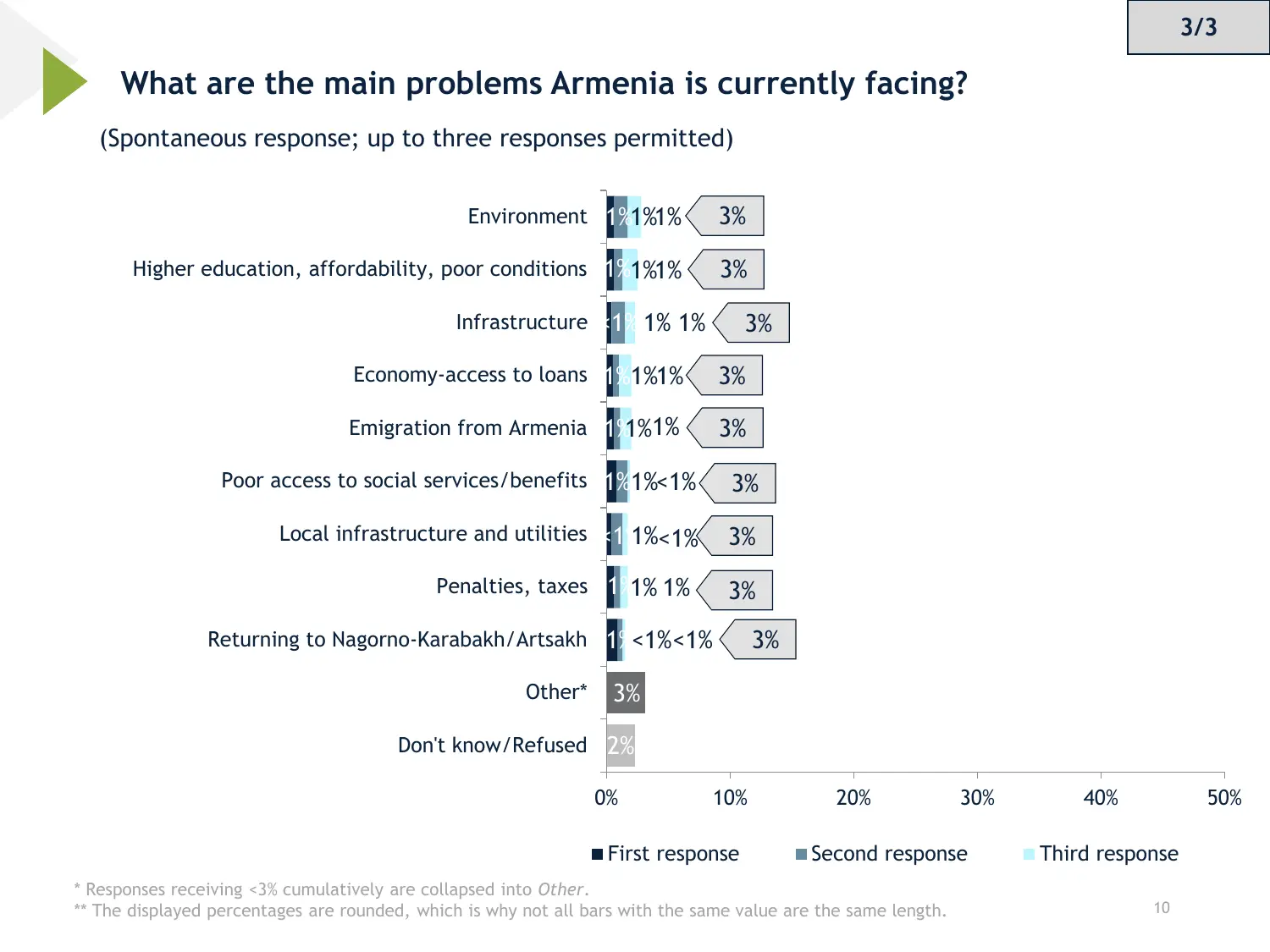
The top concern looks to be security and borders, with a third of respondents worried about this issue. The economy at 23% is the second biggest concern. But interestingly in an economy that the government claims to be going like gangbusters, people are apparently not really feeling it given that if we add the four economy subtopics in the top 30, it would rank as the top concern at 51%.
By the time we get to the 8th highest concern, which is the quality of schools and education, already less than 10% of respondents listed it as a concern.
More alarmingly, the needs of displaced Artsakh Armenians show in 18th place, with 3%, and the return of Artsakh Armenians to their ancestral lands clocks in at 28th, with a little over 2%.
Question:
- We were truly surprised as everyone we interact with would probably list Artsakh related topics and the fate of our Artsakhtsi brothers and sisters as a top concern. So can you tell us what factors led to this result in the poll?
Slide 39: How important is it for the Armenian government to help the Armenians who have been forcibly displaced from Nagorno-Karabakh/Artsakh?
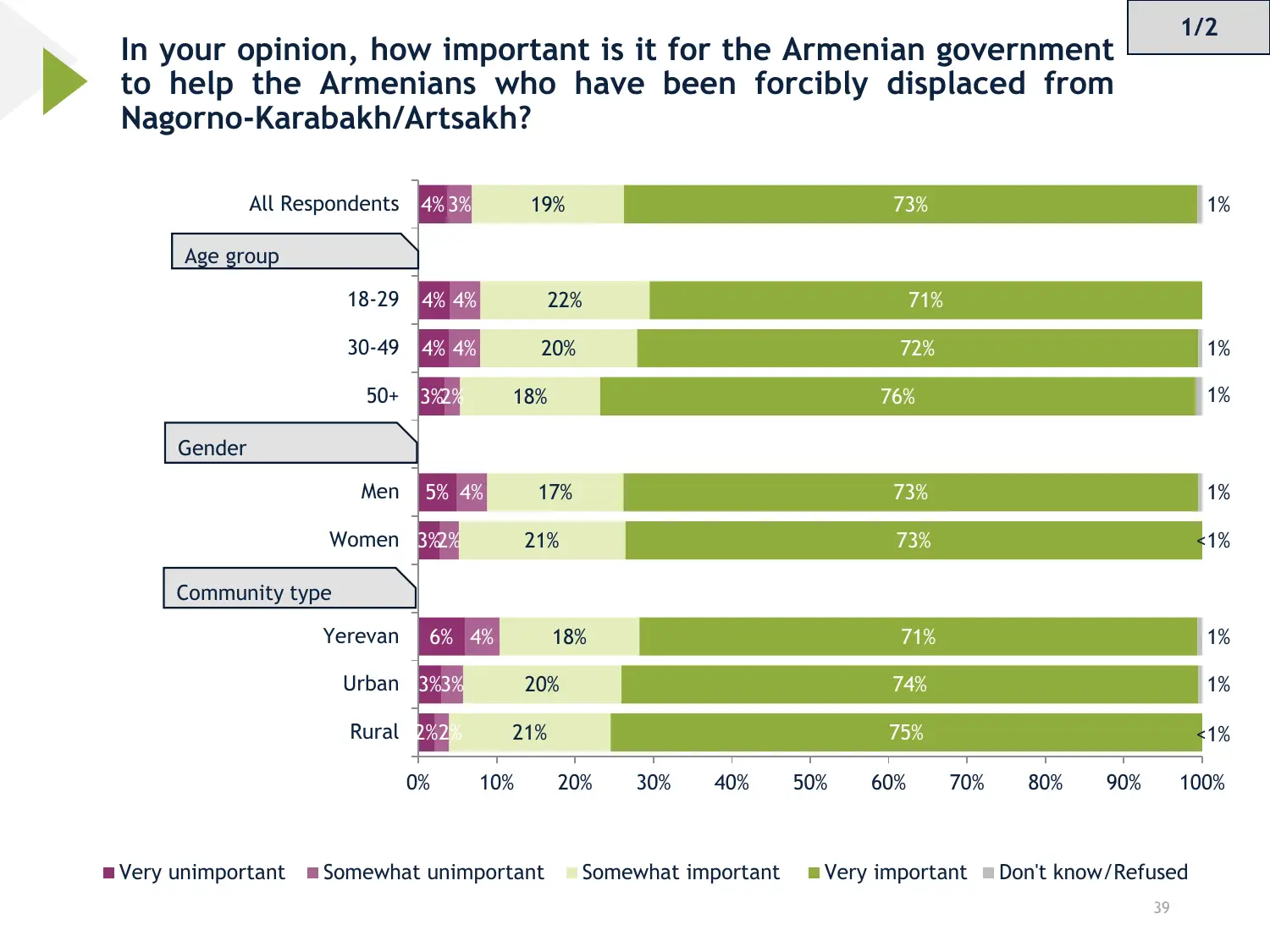
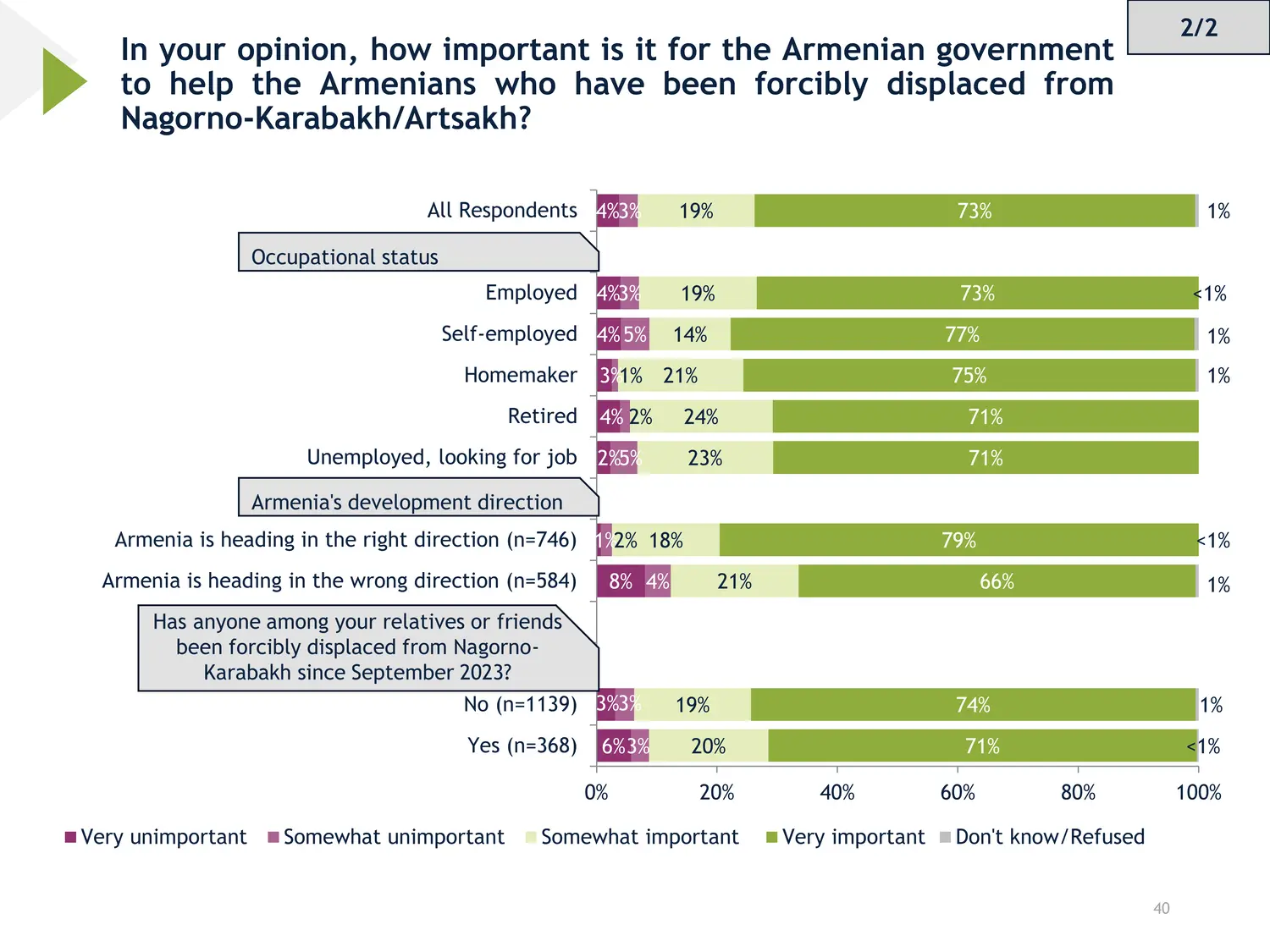
Again, for a topic that doesn’t seem to be very high on the minds of Armenians, it’s interesting to see an across-the-board of demographics over-70% agreement that it is “very important” for the government to help the people of Artsakh.
Questions:
- Thoughts? Do you see any incongruencies in the poll results?
How satisfied or dissatisfied are you with the Armenian government’s handling of the crisis related to forcibly displaced Armenians from Nagorno-Karabakh/Artsakh?
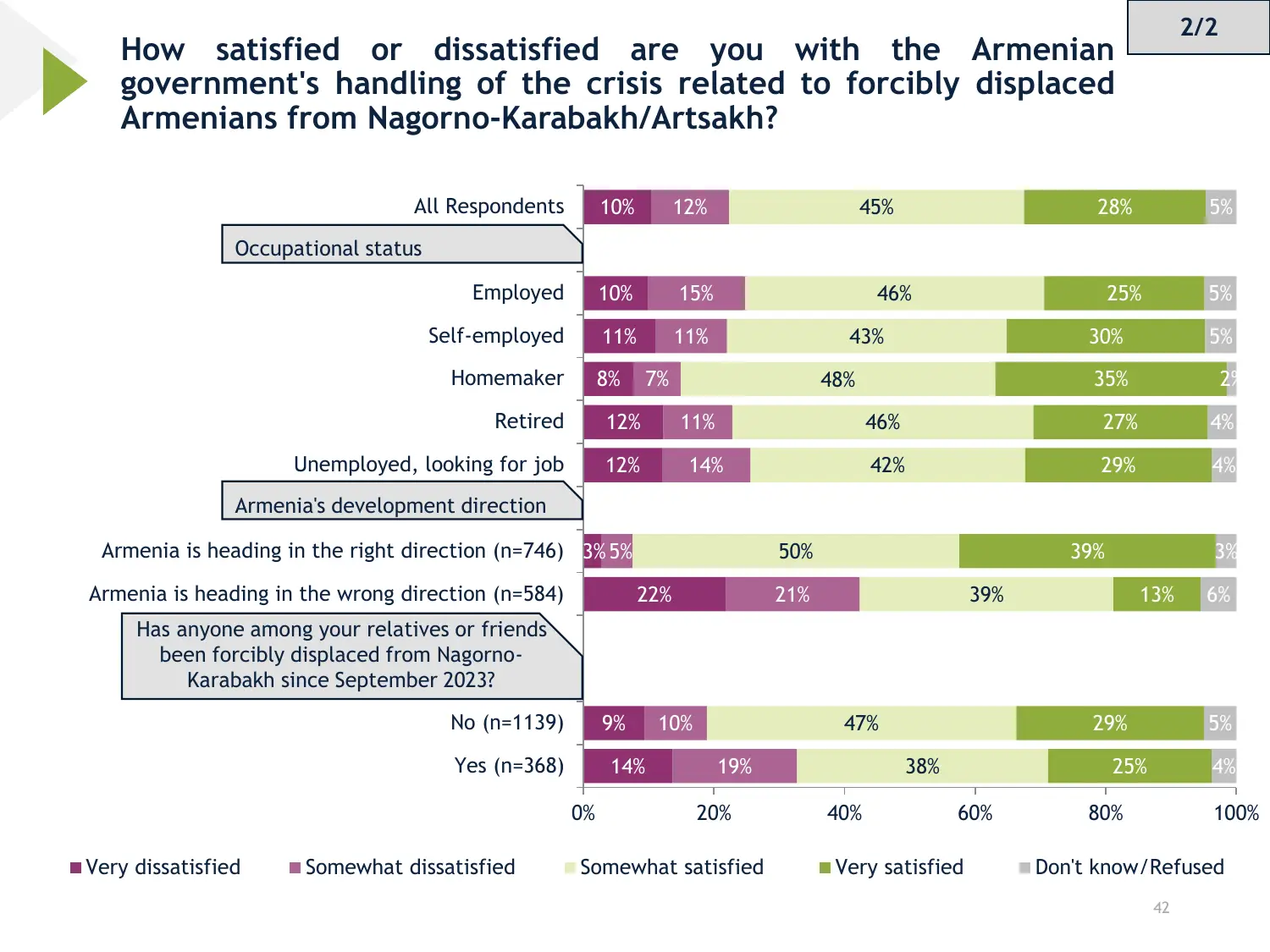
It seems that most people are satisfied with the government’s handling of the Artsakh refugee crisis.
This is in the face of countless problems, including:
- Many Artsakhsis still hadn’t received their aid, when this poll was conducted?
- Mention slide where they say HOUSING has been a major issue.
- The Armenian government was putting artificial challenges as condition for receipt of aid, such as declaring they’re not citizens of Armenia
- Many Armenians to date are responsible for providing housing and aid out of their pocket to Artsakhtsis.
All these nuances seem to be lost on the poll respondents.
We can see however that the biggest disaggregation signal comes when we compare the answers of those who said Armenia is going in the right direction vs. those that disagreed.
Question:
- So can we say that this issue is heavily influenced by geopolitical leanings of the respondents?
Slide 15: Which politician or public person do you trust the most? And the second most
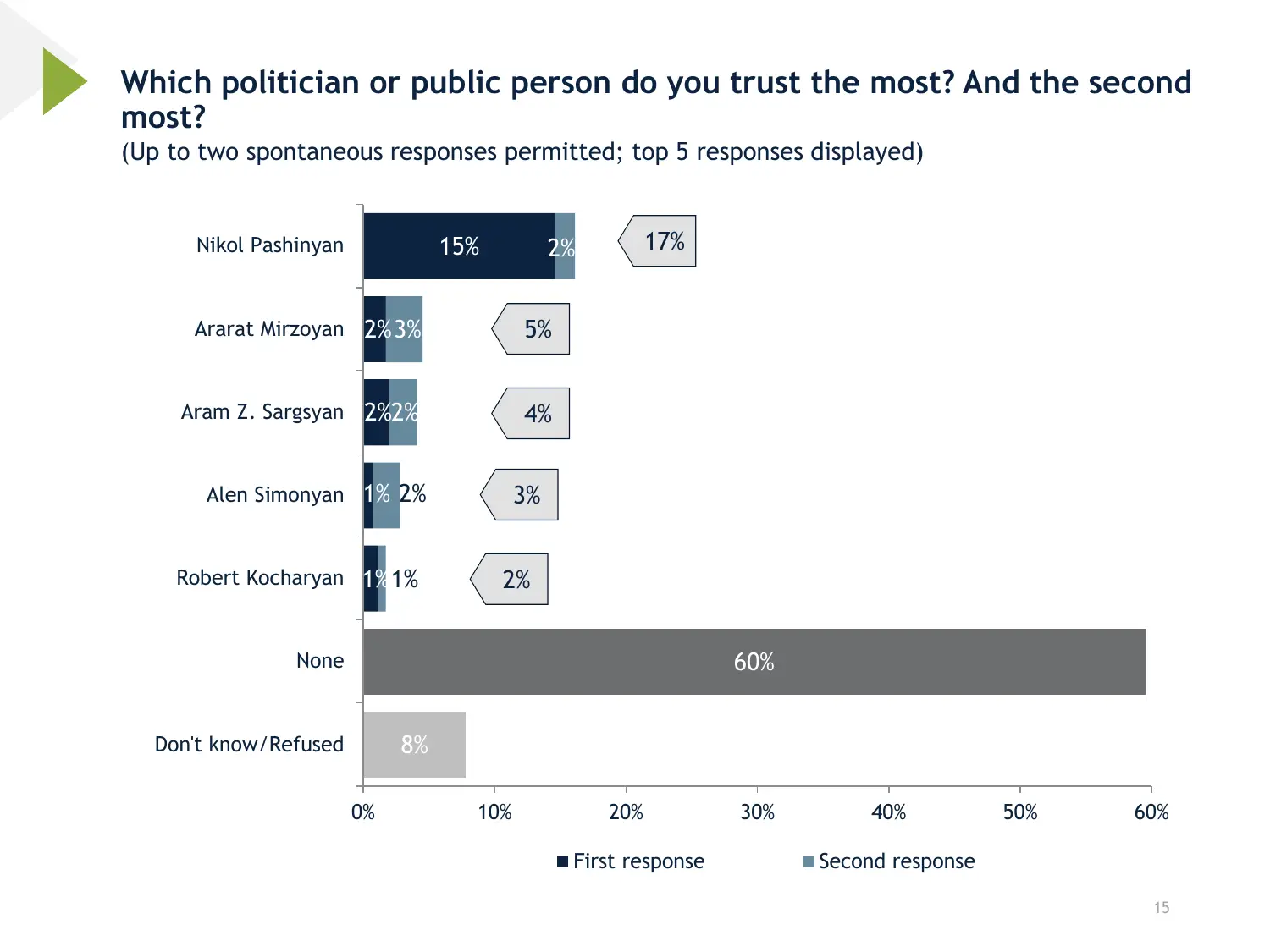
Pashinyan tops the list of “most trusted” at 17%. That is hardly “trust”. As usual, the nobody slot wins hands down at 60%, showing a disenfranchised voter base in Armenia.
Slide 16: Which political party or alliance, if any, would you vote for if national parliamentary elections were held next Sunday
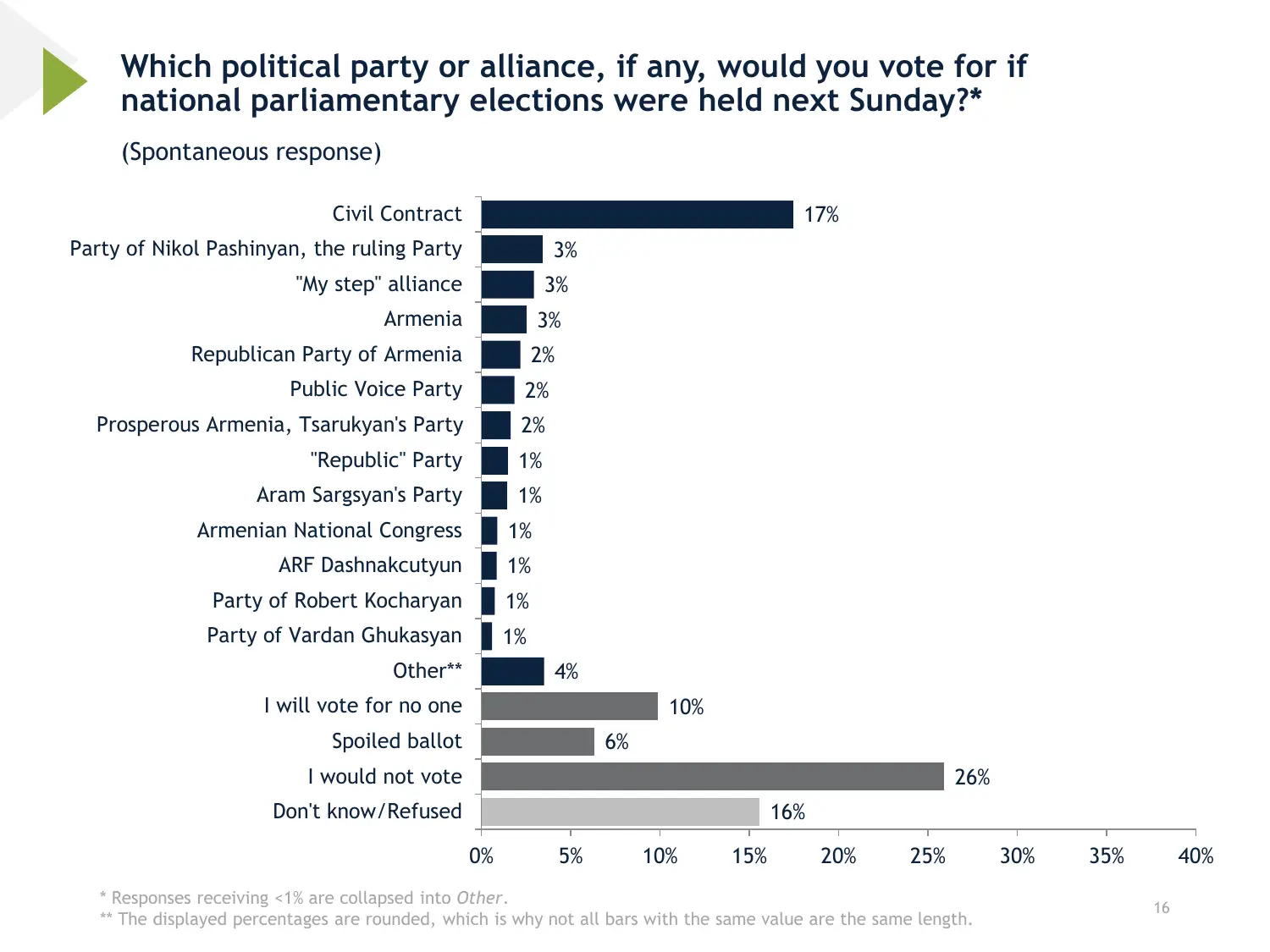
Similar results for the political parties, the list is topped by the current ruling party, but at a mere 17%. We already knew in practice since the Yerevan elections in September 2023.
Questions:
- Hrant, how would you explain this result?
- These results have been consistently low for over a year.
Slide 19: How satisfied or dissatisfied are you with the work of the following institutions?
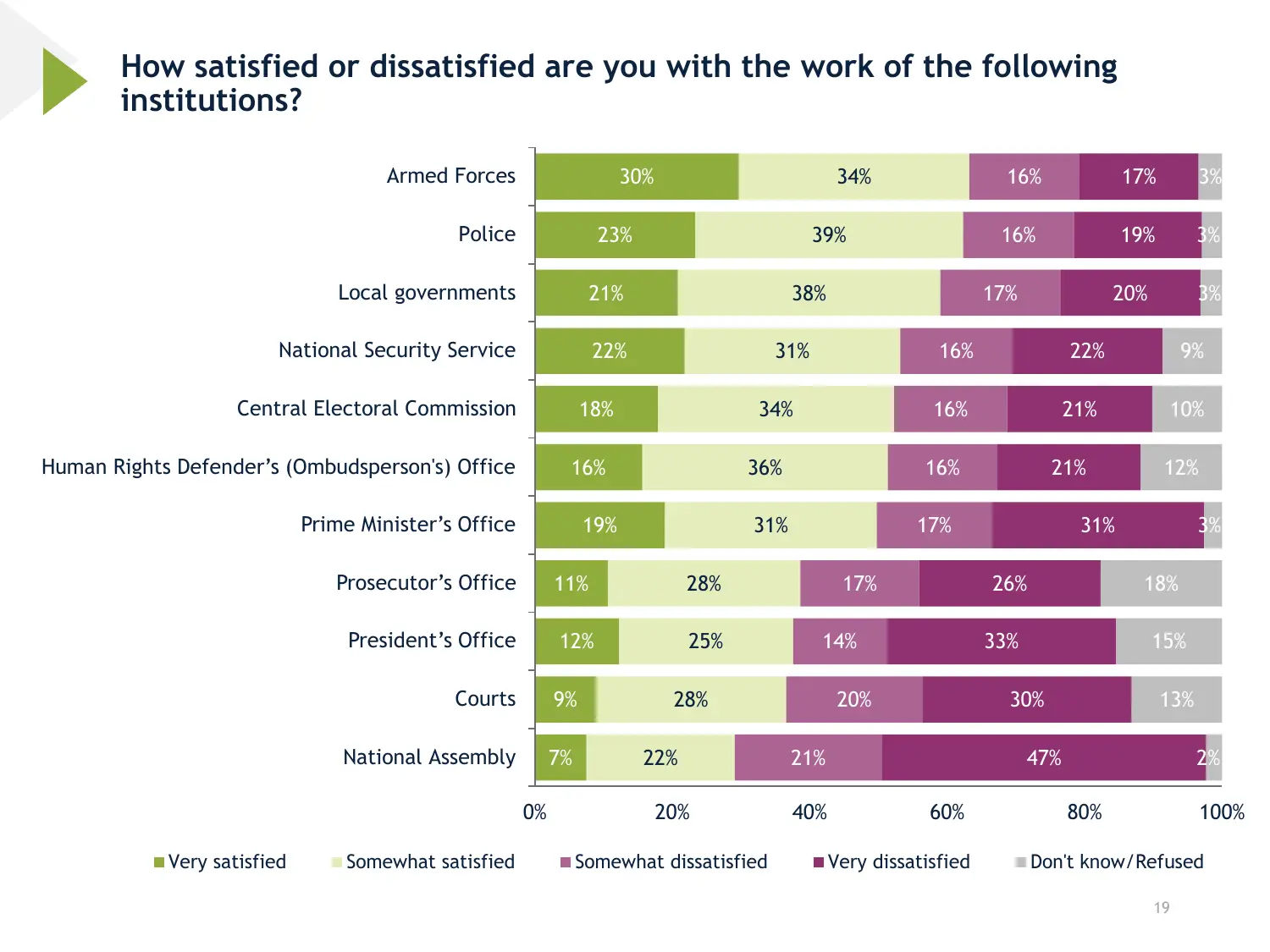
Starting with the Prime Minister’s office, the anti-rating starts to overtake the positive rating, highlighting sharp division among respondents. For the Prime Minister’s office, 40% are satisfied in general, while 38% are dissatisfied. The National Assembly has the highest antirating, with 47% “very dissatisfied” and 21% “dissatisfied”.
This is consistent with the low rankings that the government and the ruling party are getting in the previous slides.
Slide 26: How do you feel about the direction of each of the following spheres during the past six months?
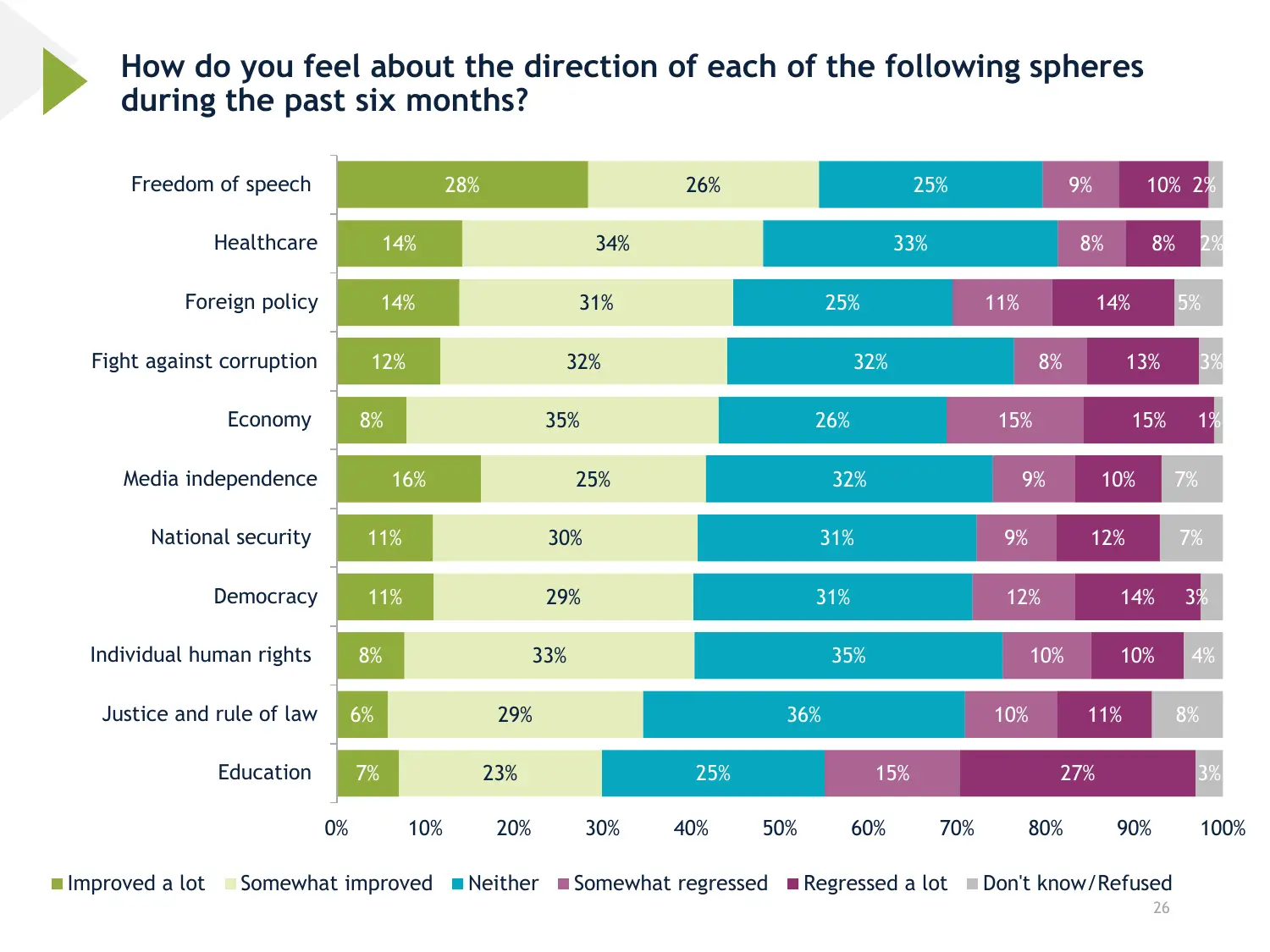
We can probably skip this. Large number of disaffected people who think it’s all the same, and together with the marginal yes/no’s it seems like this is a no-op.
Slide 36: What do you think is the biggest success of the government during the last 6 months?
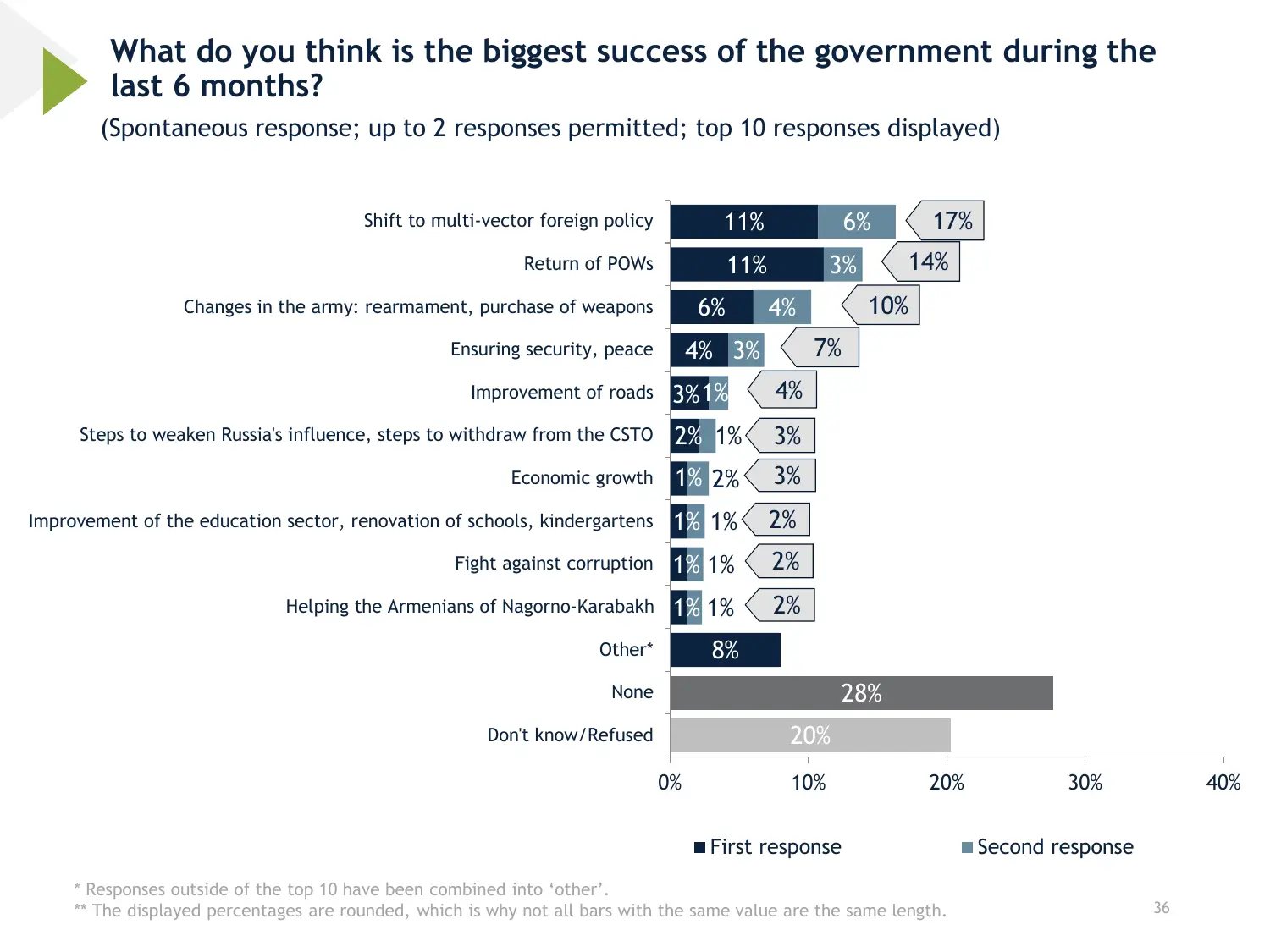
The government channels are consistently pushing their “դիվերսիֆիկացում” business these days, so it’s not a surprise that “multi-vector” is listed as a top item. The same goes with the purchase of weapons, with French and Indian purchase stories and micro-details in government channels almost every day.
Yet, while other slides indicate that people think that government aid for Artsakh has been acceptable, here people do not consider it an achievement, at 2%.
Slide 37: What do you think is the biggest failure of the government during the last 6 months?
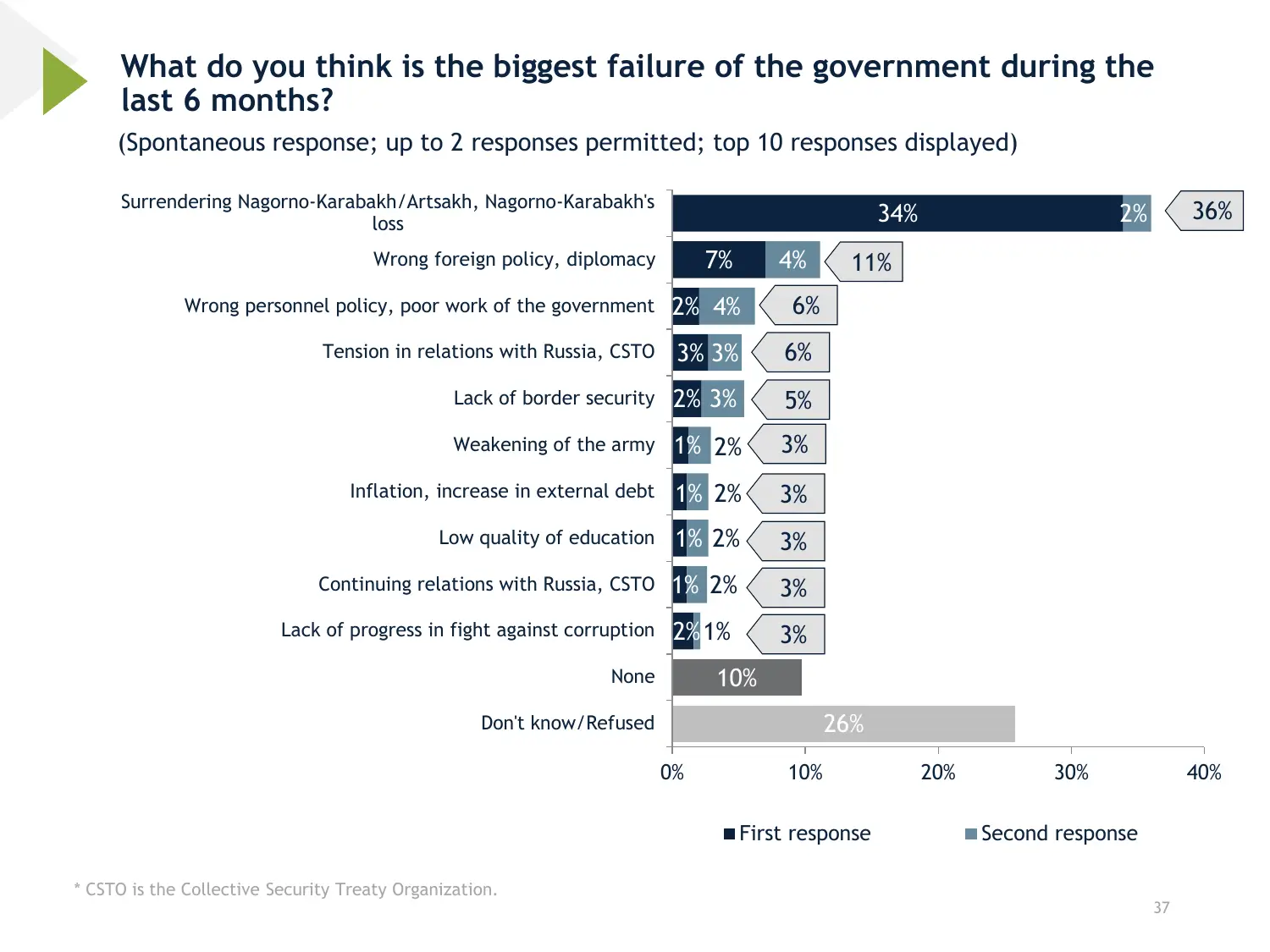
Questions:
- Given the general apathy towards the Artsakh issue in other slides, how do we explain the government’s “biggest failure” showing up in this question?
Slide 38: What are things you believe that Nikol Pashinyan’s government must achieve in the next 6 months, if any?
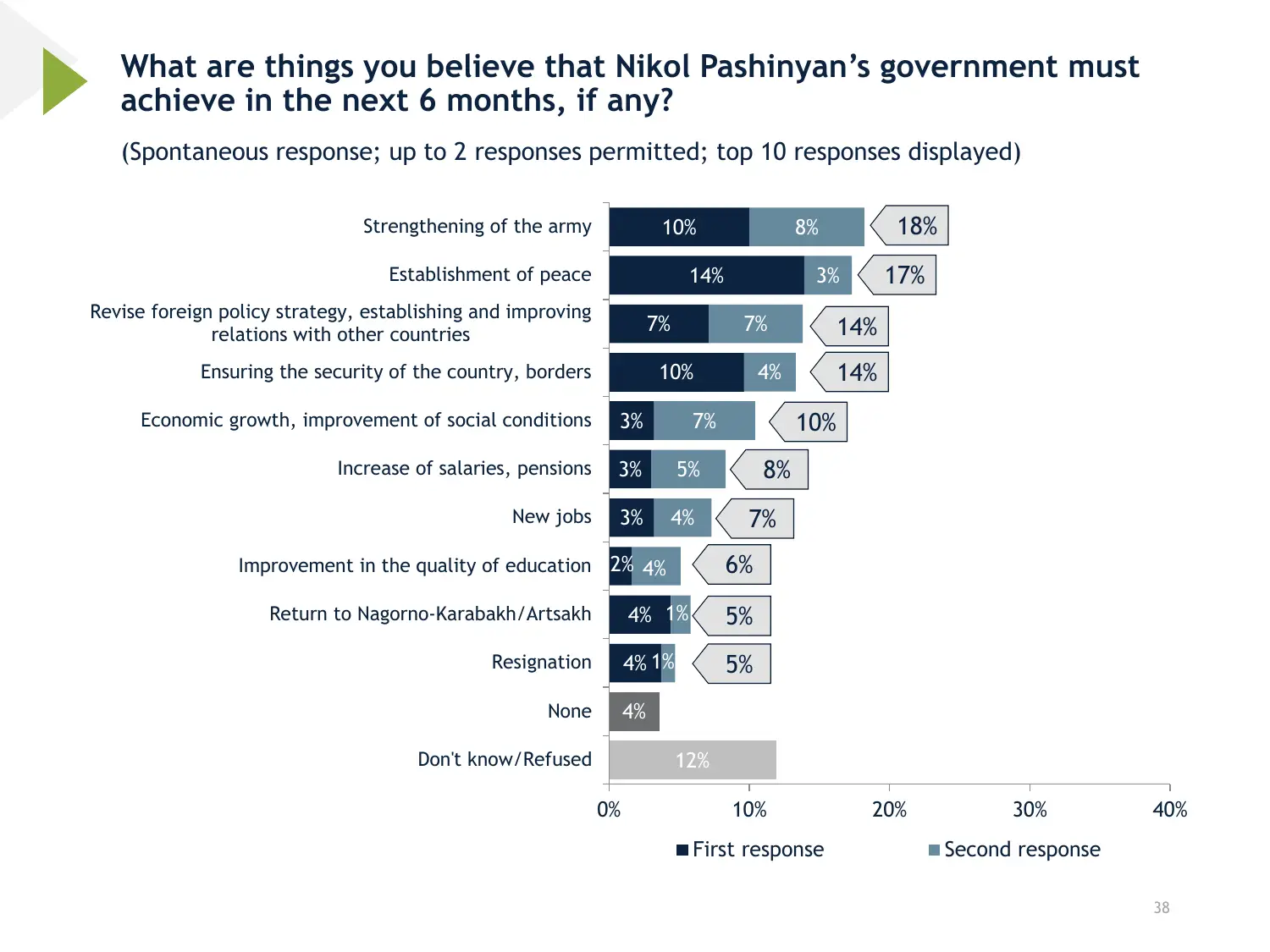
We’ve noted the unusually frequent media articles about military deliveries from the west. Not so much from the Russians, despite statements that the Russians had all but fully delivered on the $400 million order. How? That’s still a state secret it seems.
The uneven treatment of the issue in government media is suspicious.
Questions:
- What do you think of these responses?
- Is the government strengthening the armed forces?
Again, return of Artsakhtsis not a major concern, listed at 5% BUT ,,, (go to next slide)
Slide 43: Why are you dissatisfied? Please mention the two most important reasons, starting with the most important one.
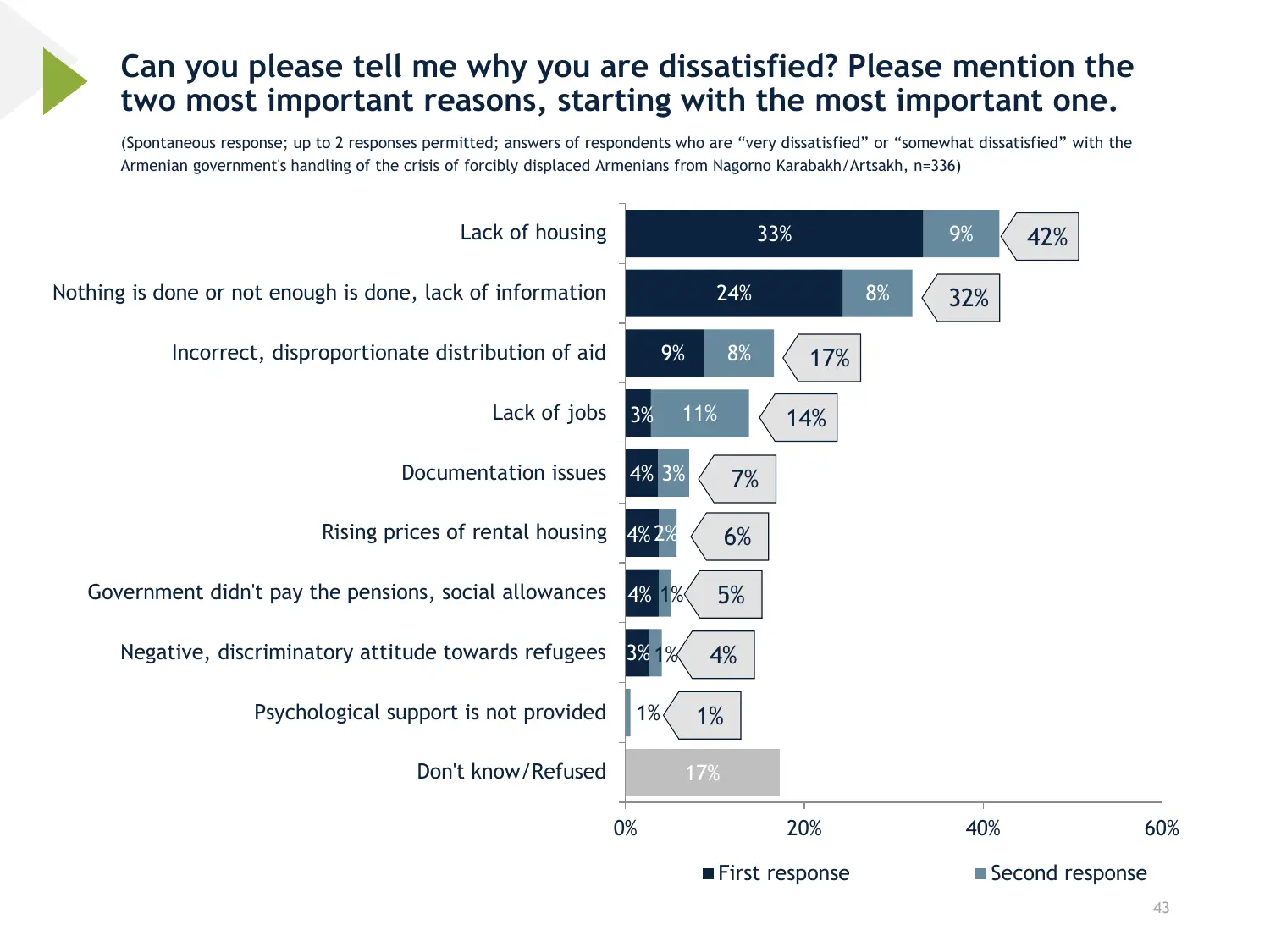
Slide 45: How would you evaluate the current state of the relationship between Armenia and …?
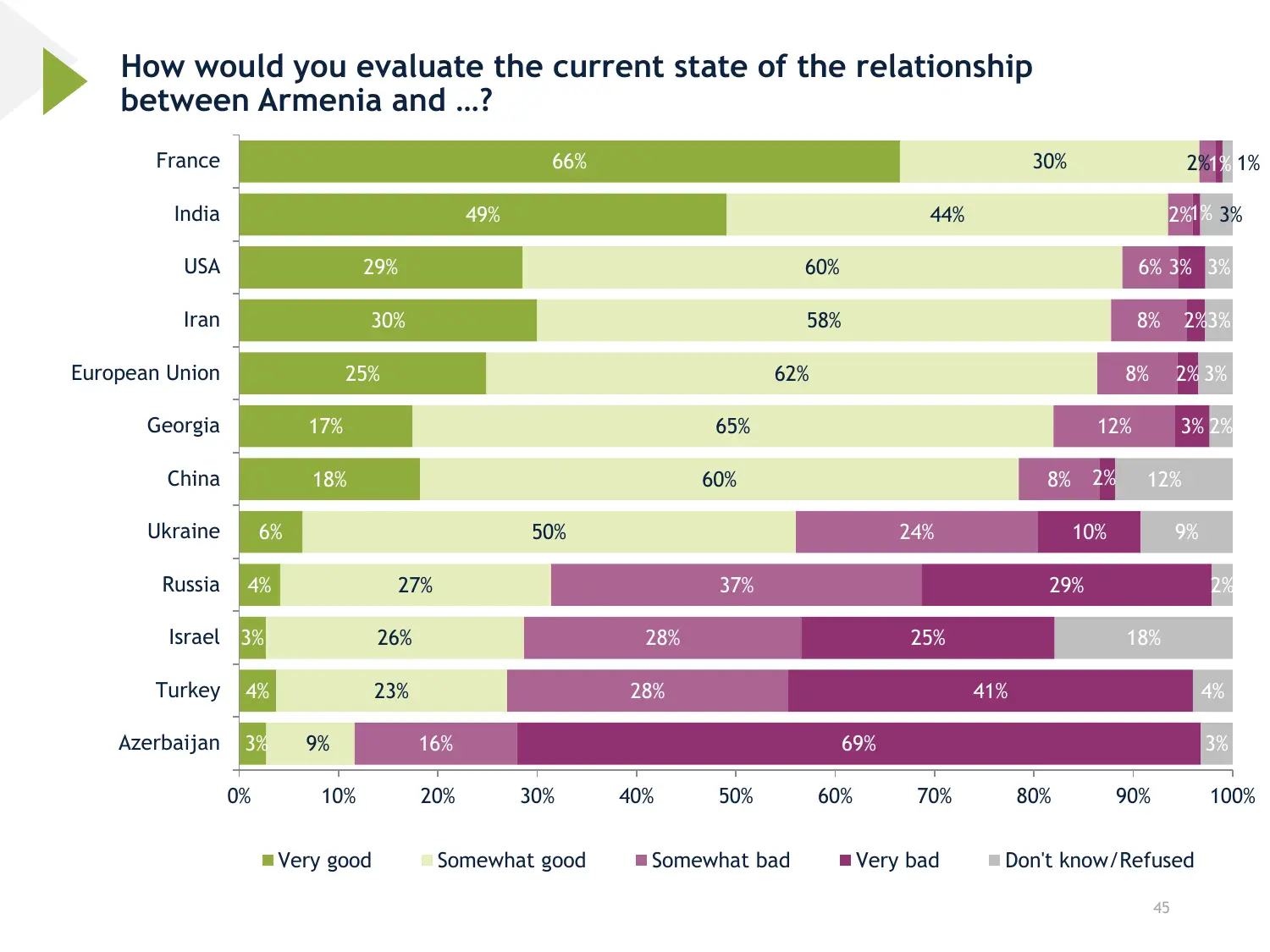
Slide 51: Which of these countries do you consider the most important _political _partners for Armenia?
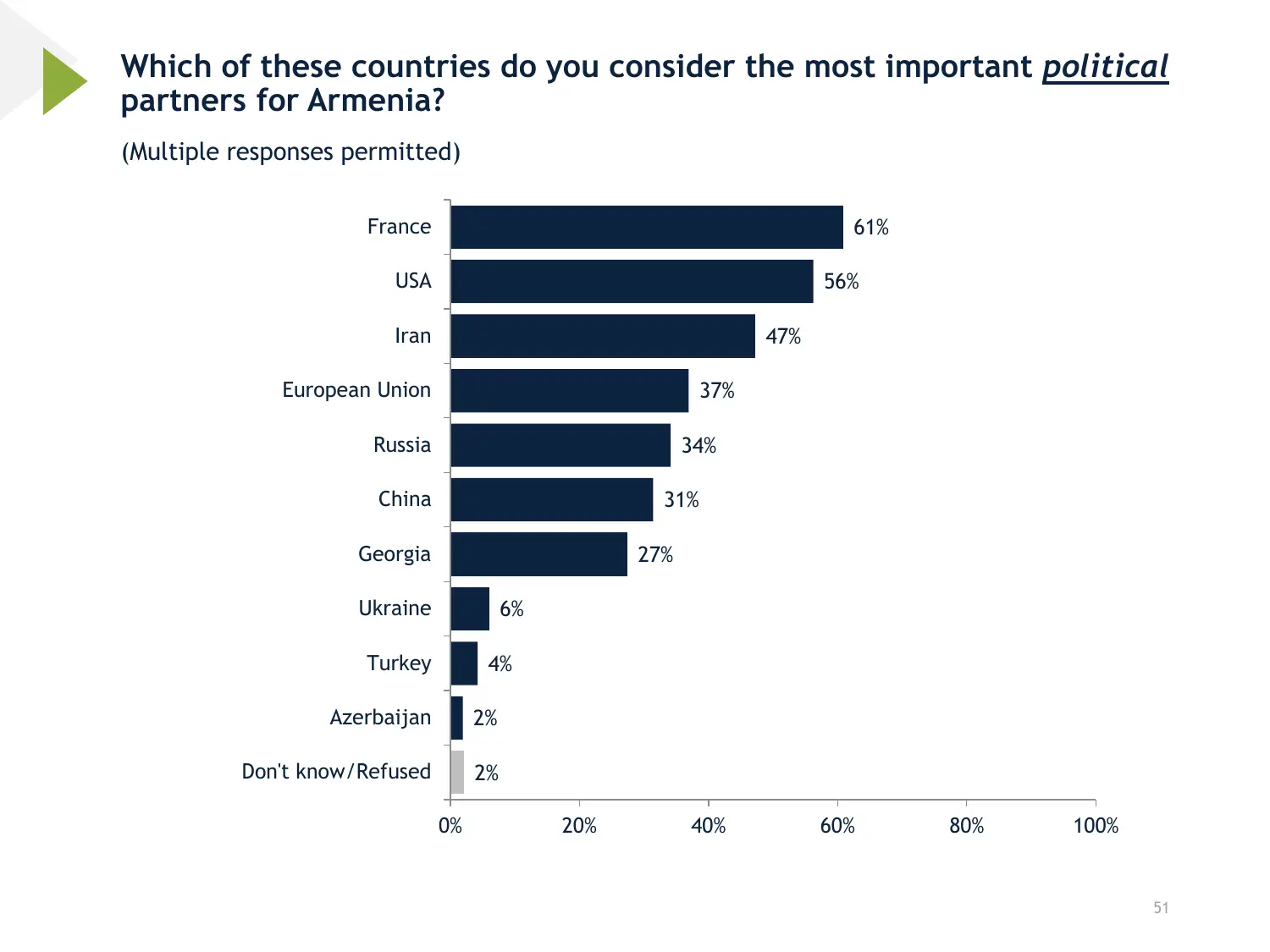

Slide 54: Which of these countries do you consider the most important _economic _partners for Armenia?
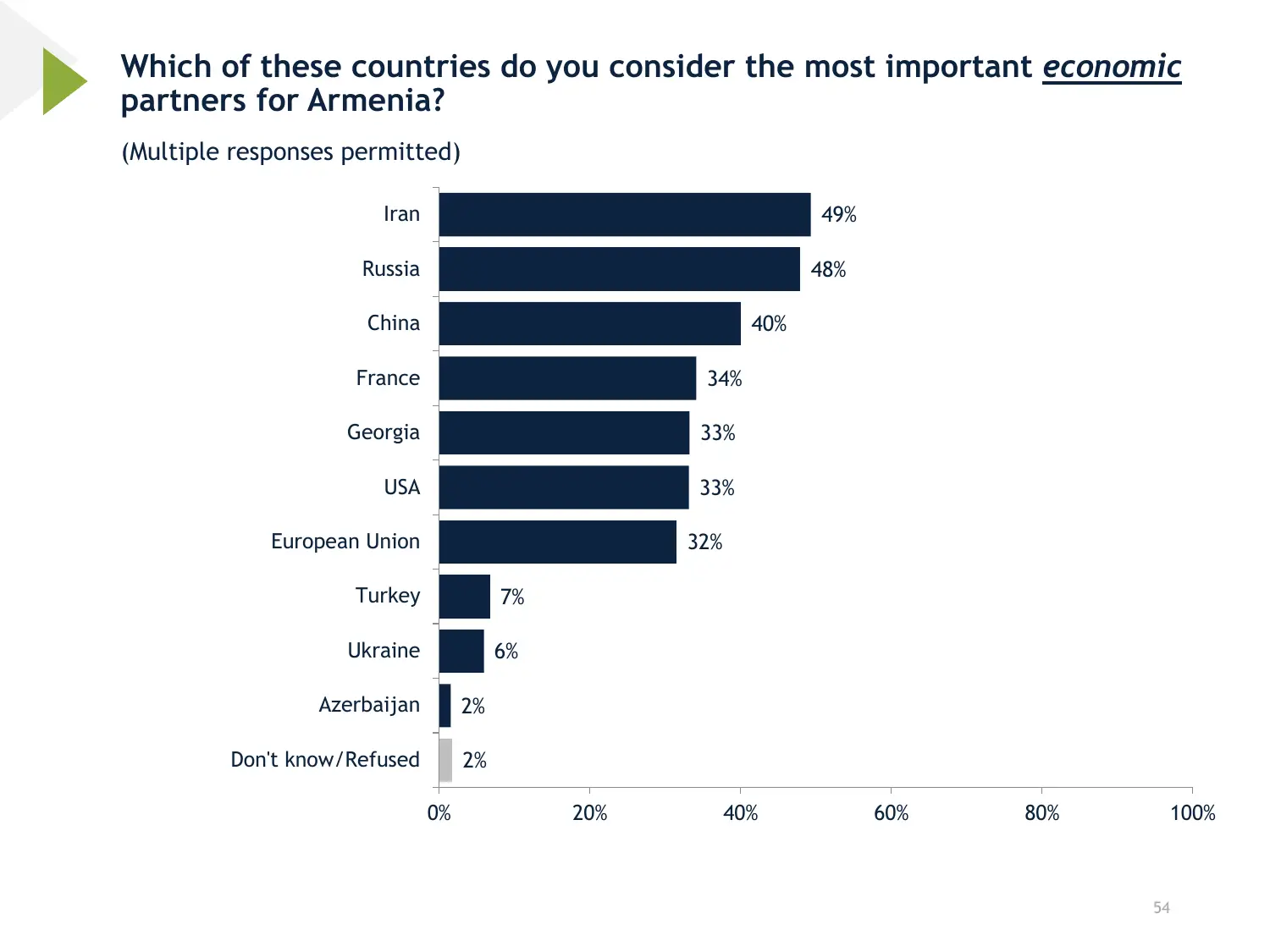
Slide 55: Which of these countries do you consider the most important _security _partners for Armenia?
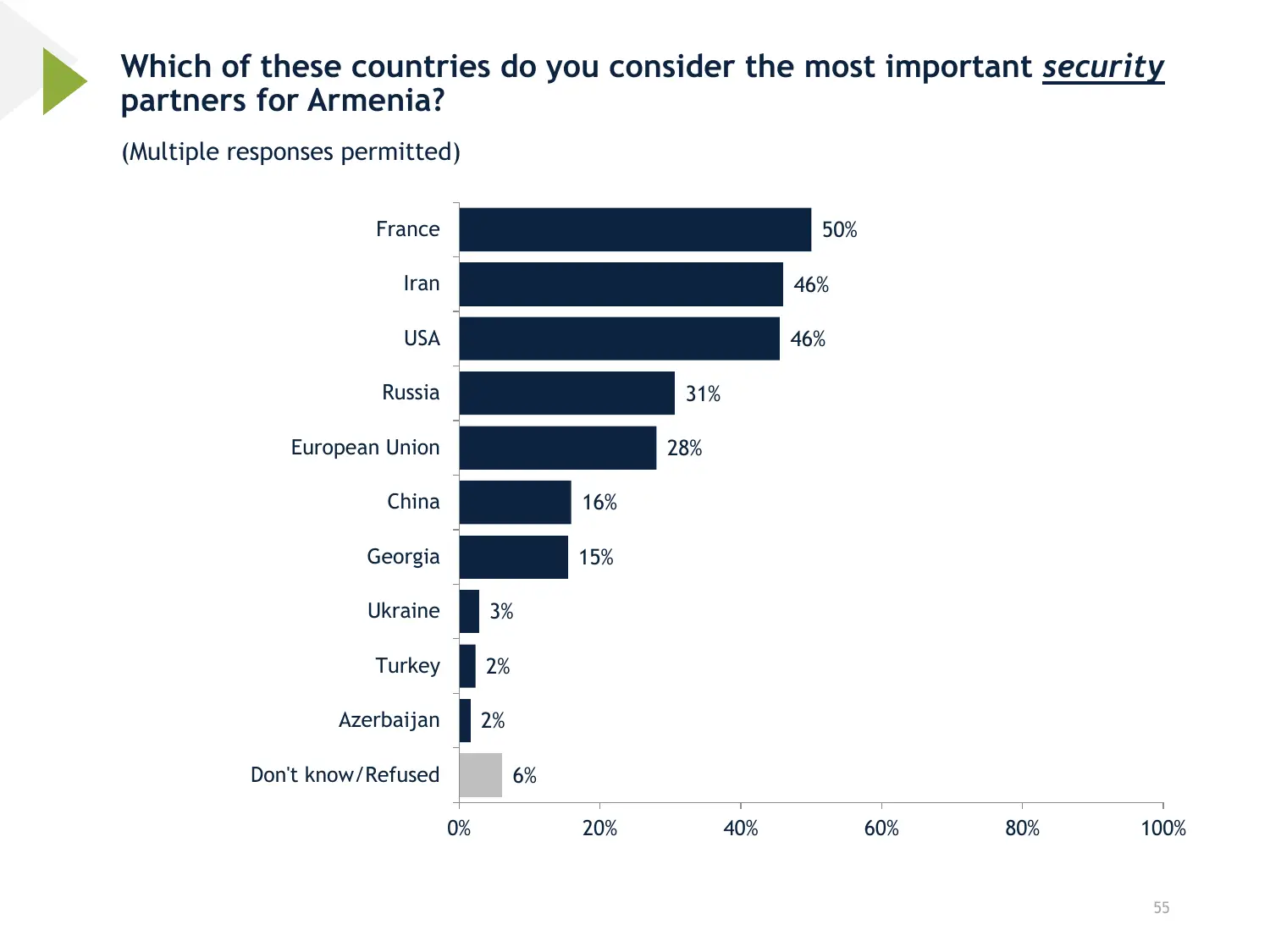
On the count of the responses about France and USA, Rand published an article today, not mincing any words. It stated right in the headline: “The U.S. Can’t Guarantee Armenia’s Security, Despite Azerbaijan’s Threats, but It Can Help”
The article ends with the following conclusion:
“The United States and its European allies cannot be everything Armenia wants and needs from a foreign partner. Yerevan is going to maintain complex economic, social, and strategic relations with its neighbors, including both Russia and Iran, and it would be folly to pressure them to make an all-or-nothing binary choice between a Western alignment or nothing. The West should recognize and accept Armenia’s multi-alignment and focus on areas where it is comparatively able and willing to deepen ties and foster stability.”
Slide 56: Which of these countries poses the greatest _political _threat to Armenia?
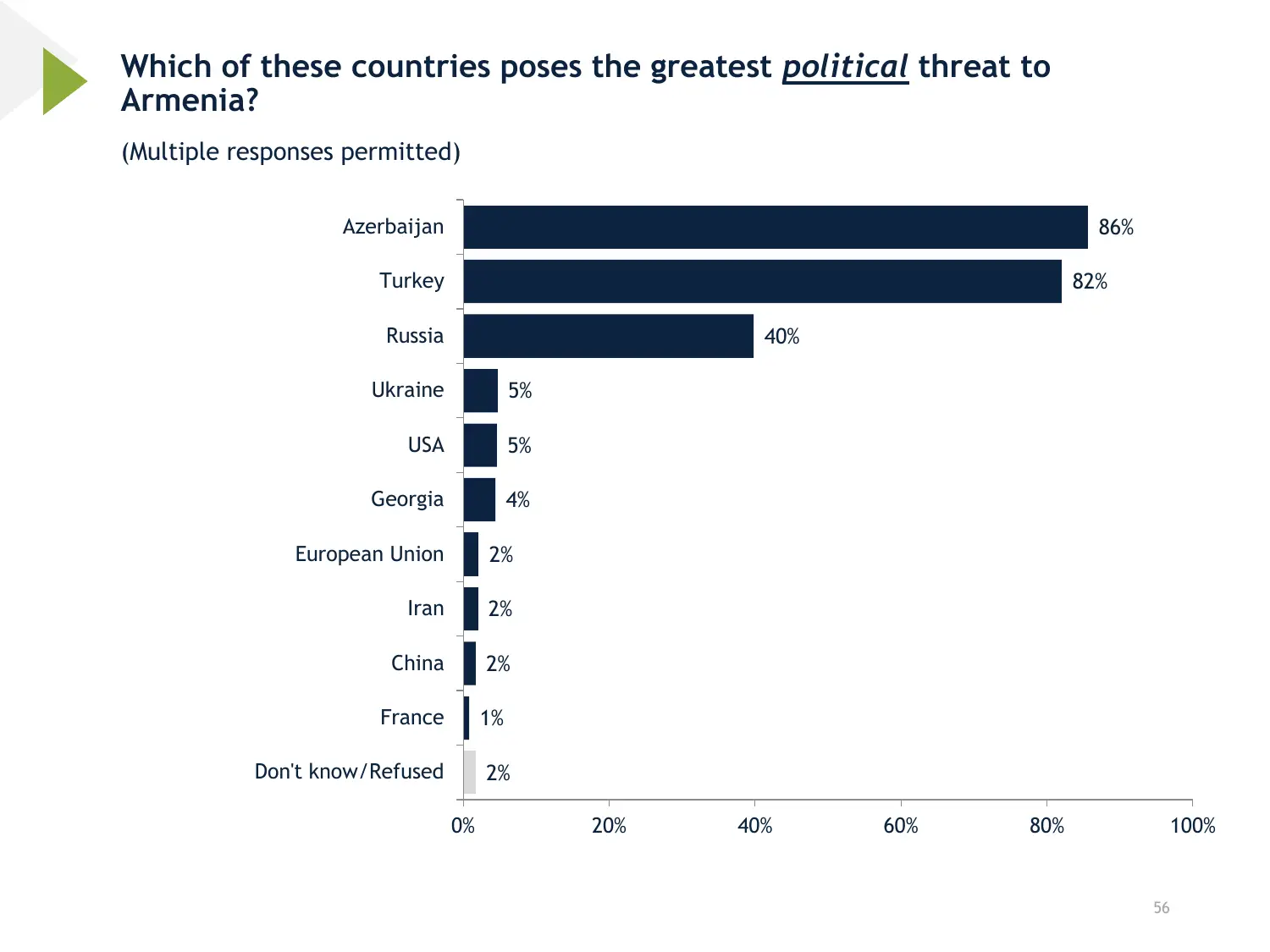
Slide 57: Which of these countries poses the greatest _economic _threat to Armenia?
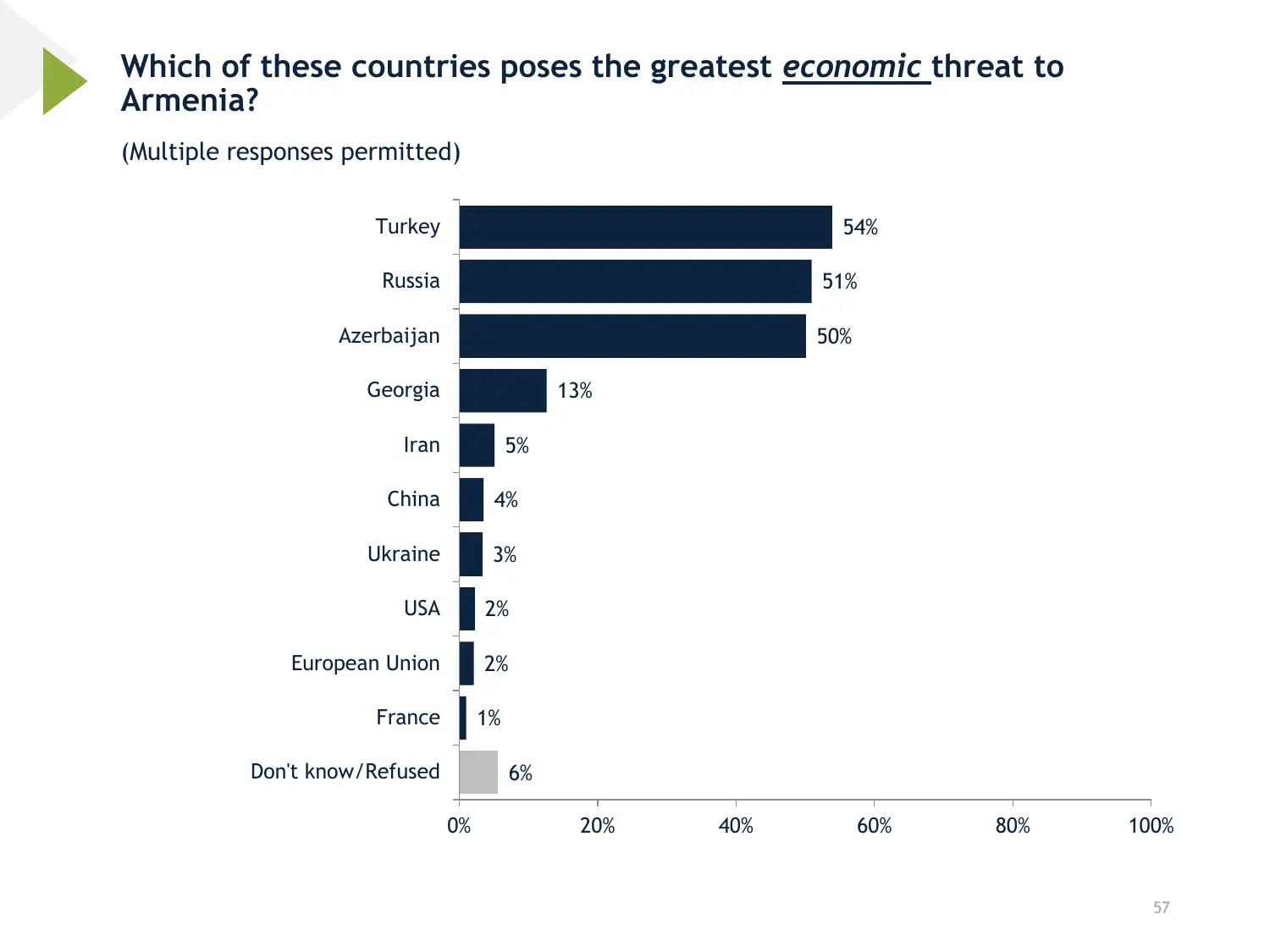
Slide 59: Which specific media outlets do you consider most trustworthy for political information?
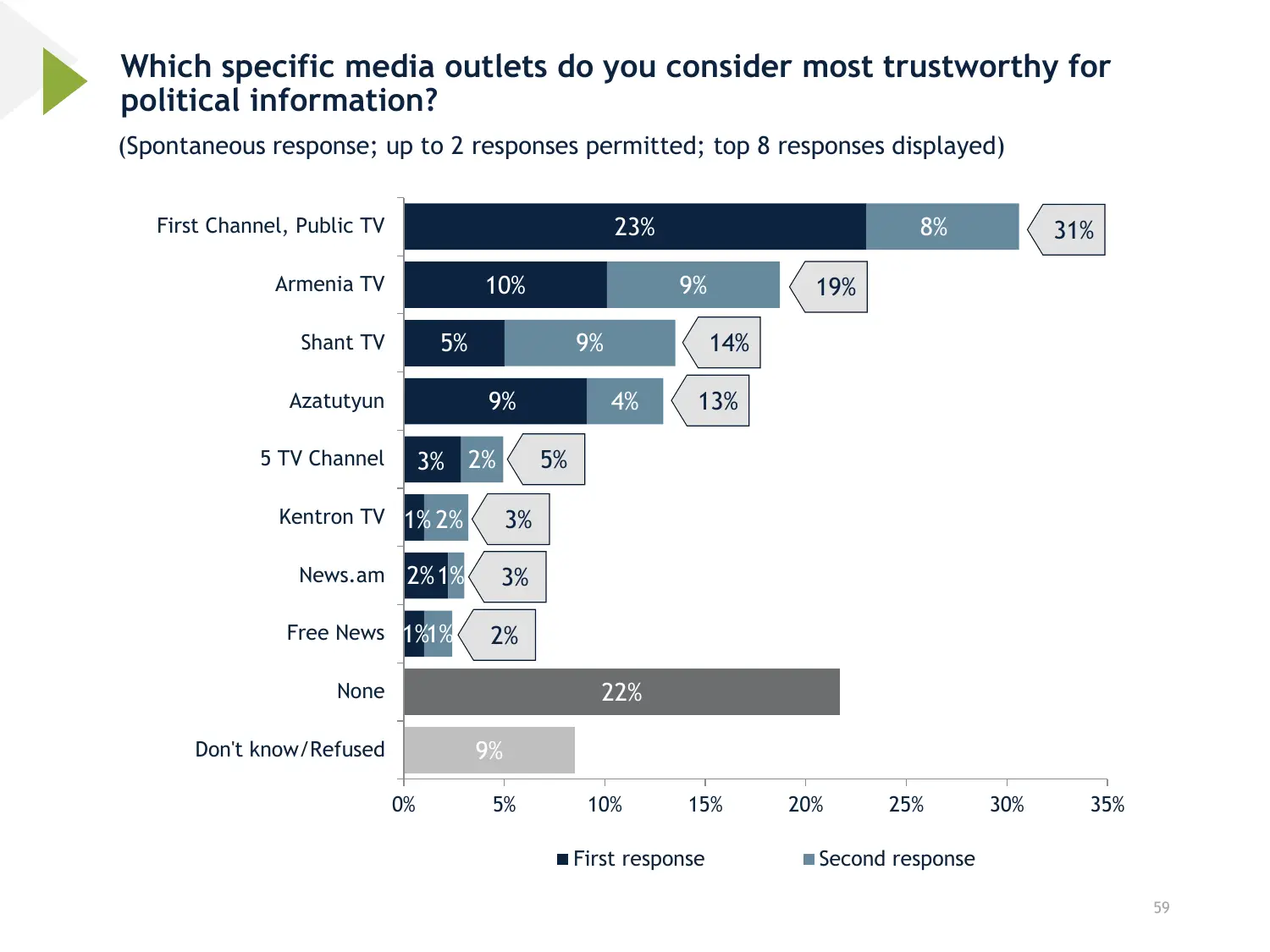
Two thirds of the respondents have listed government channels as their main source of information.
Questions:
- What do you make of this? Are they listening to a fully objective range of information?
Slide 60: Which TV news program or YouTube channel do you view the most for political information?
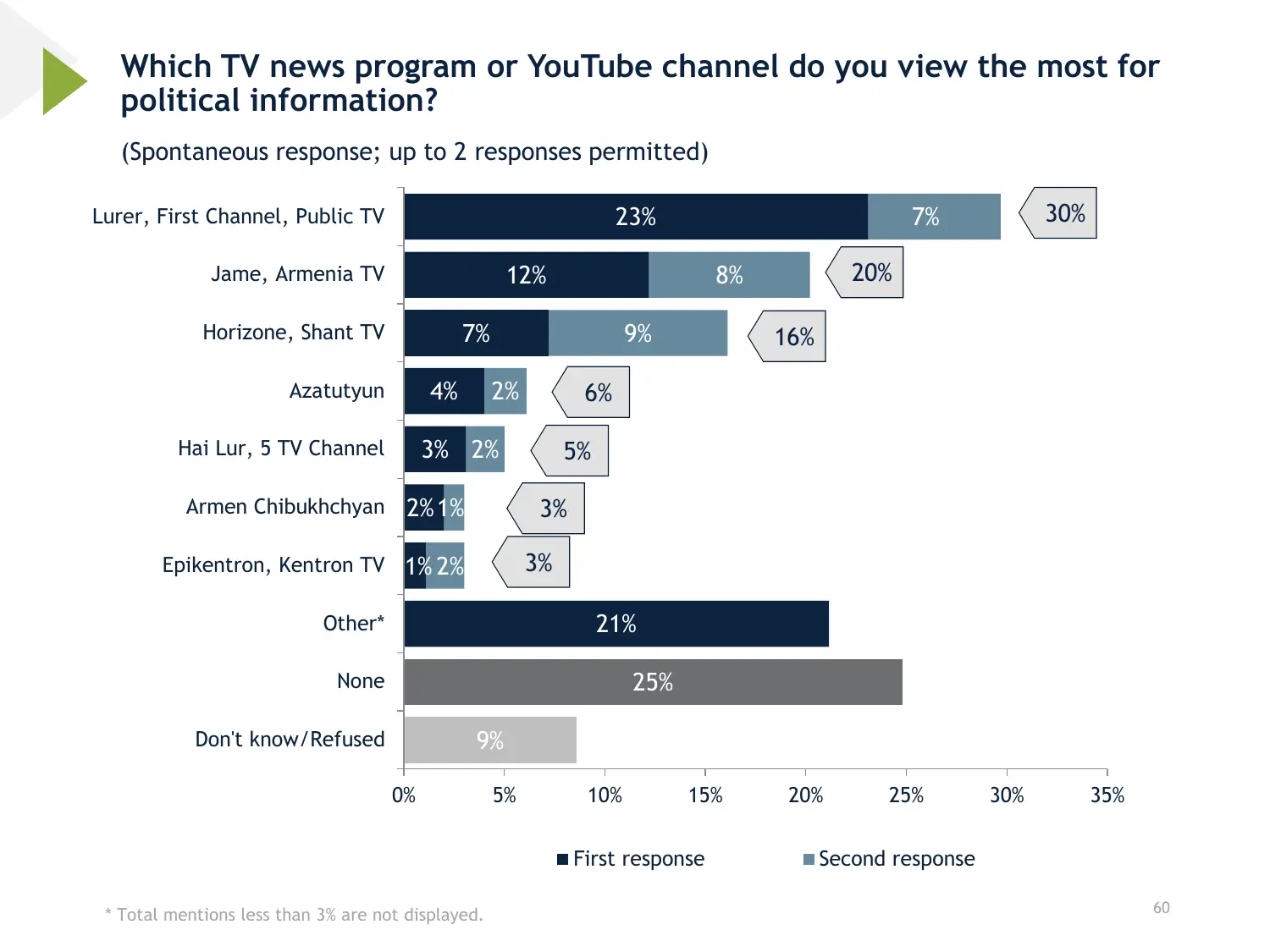
Slide 61: How trustworthy or untrustworthy you think each of the following are as a source of information on the security situation in Armenia?
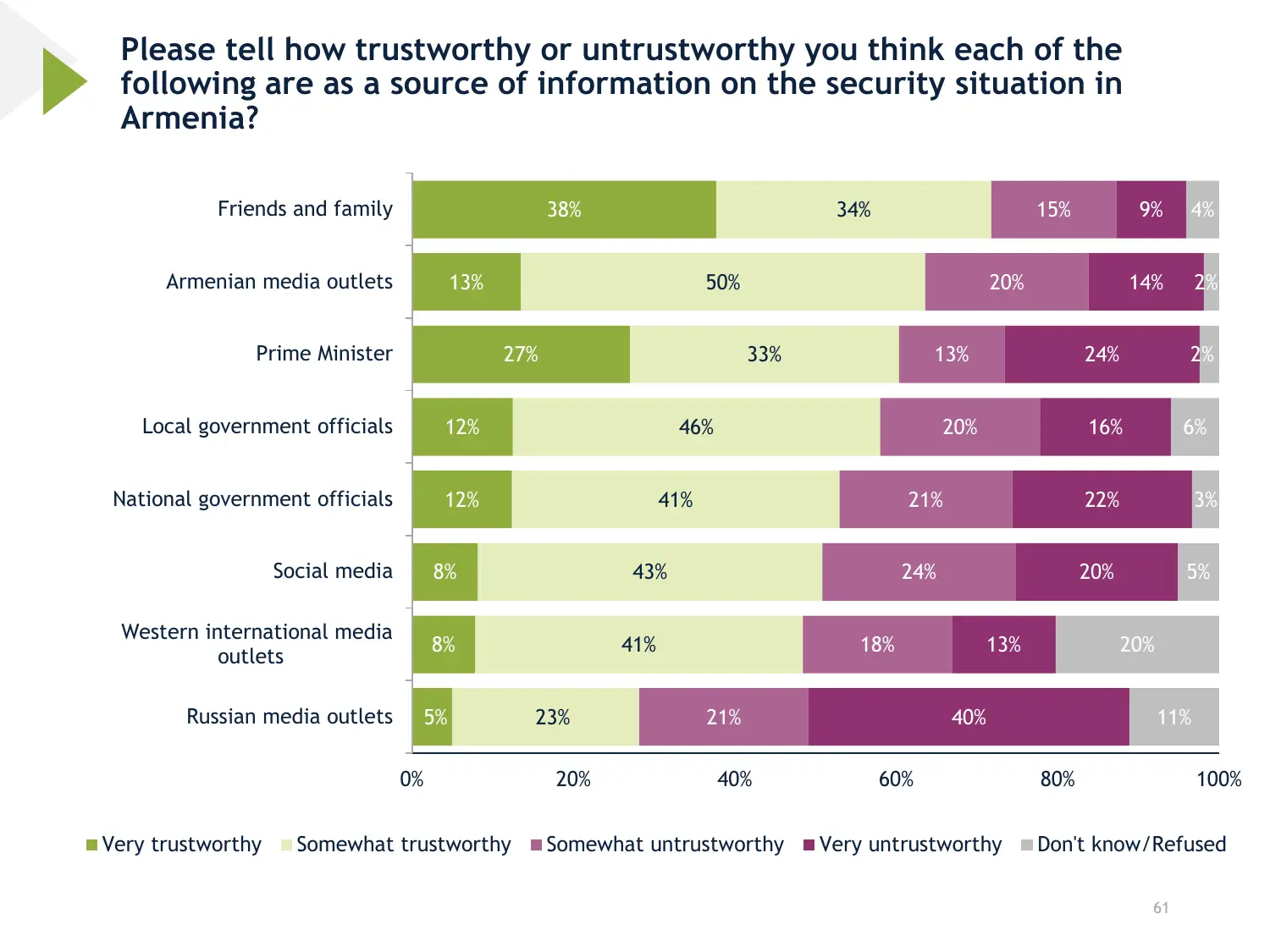
MPG Poll
The MPG poll was conducted at the end of February 2024. It polled 1,100 residents and estimates a plus or minus 3% error margin. MPG Gallup International is an independent polling organization in Armenia.
Note that the questions by the two organizations are not equivalent or full comparable.
Slide 3: Why is the political situation complicated?
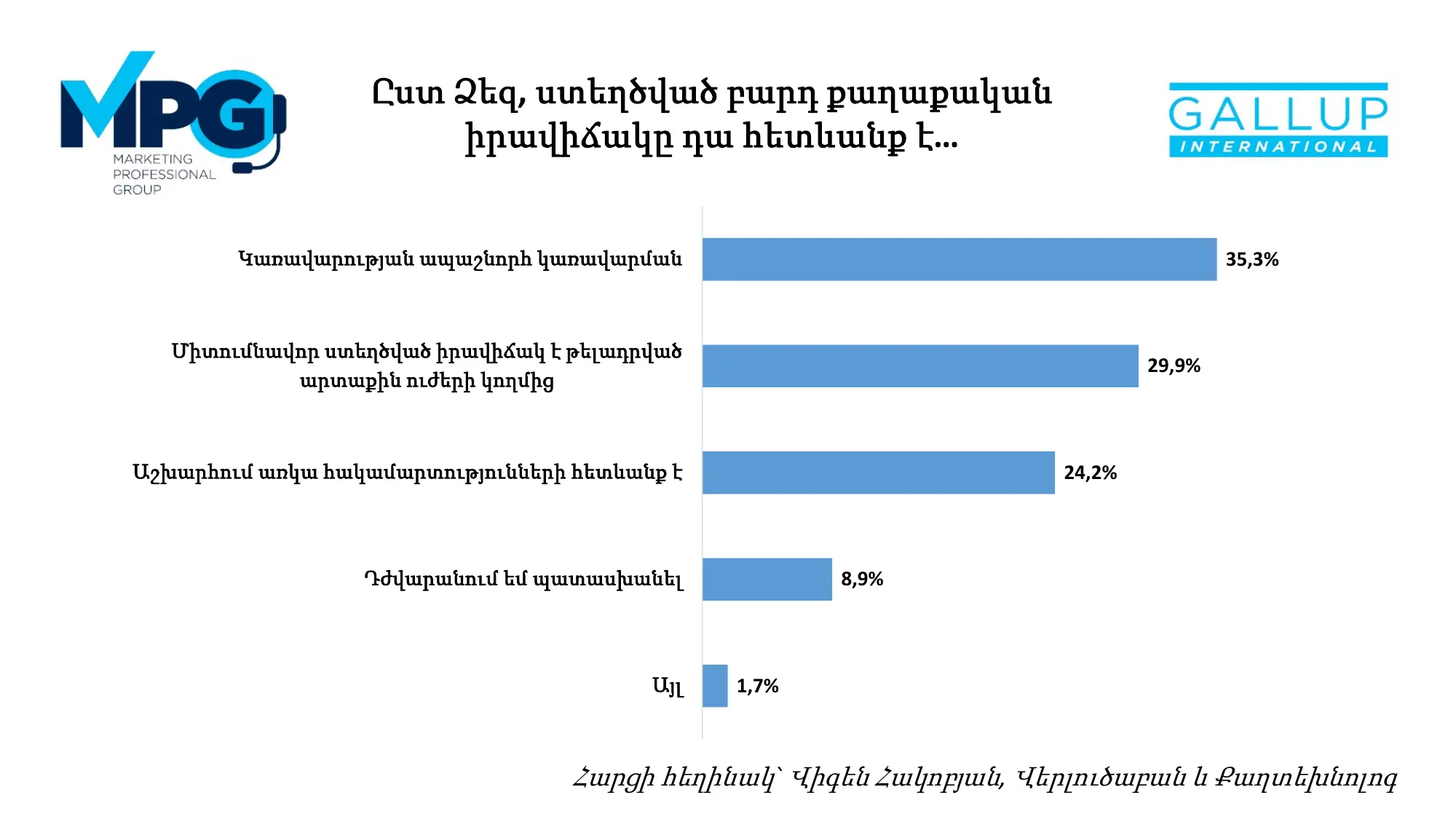
- 35% say that the Armenian government’s improper policies are responsible.
- 30% say it is dictated by external powers.
- 25% say it is due to global conflicts.
Questions:
- We could skip this slide.
Slide 4: Does the degradation of Russian-Armenian relations correspond to Armenian strategic interests?
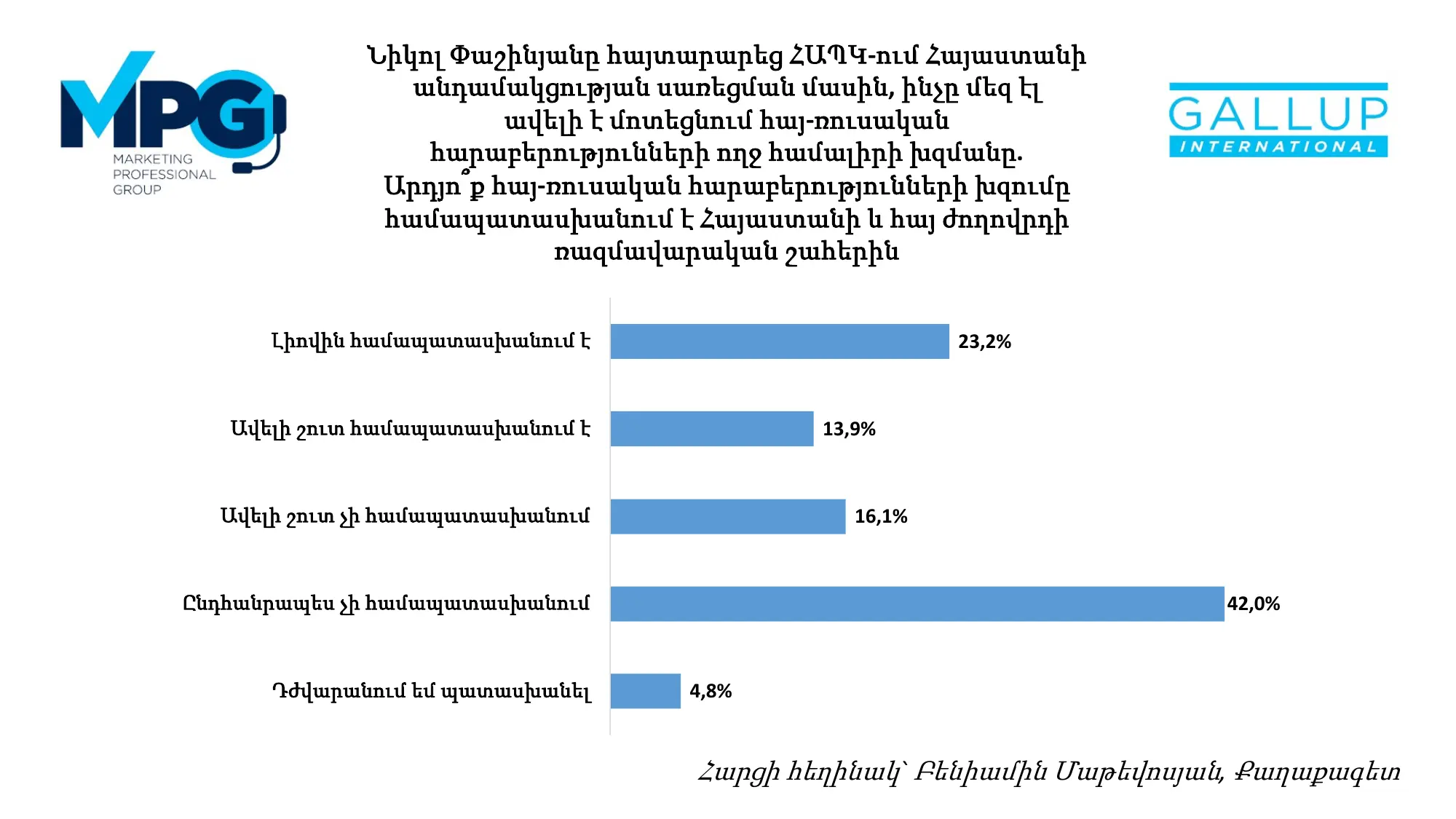
- 37% say yes.
- 58% say no.
We’ve mentioned this before that all the ruling propaganda, people in Armenia do not believe that leaving the CSTO, and possibly the EAEU, is in Armenia’s national interest. Almost 45% of Armenian exports go to Russia, and 35% of the GDP is generated through Russia. Armenians also know that Russia, nor even the EU, won’t allow Armenia to exit the CSTO and stay in the EAEU. This means that the EAEU free-trade agreement with Iran would also be annulled between Armenia and Iran.
Slide 5: Should Armenia continue participating in the CSTO, or try to join NATO?

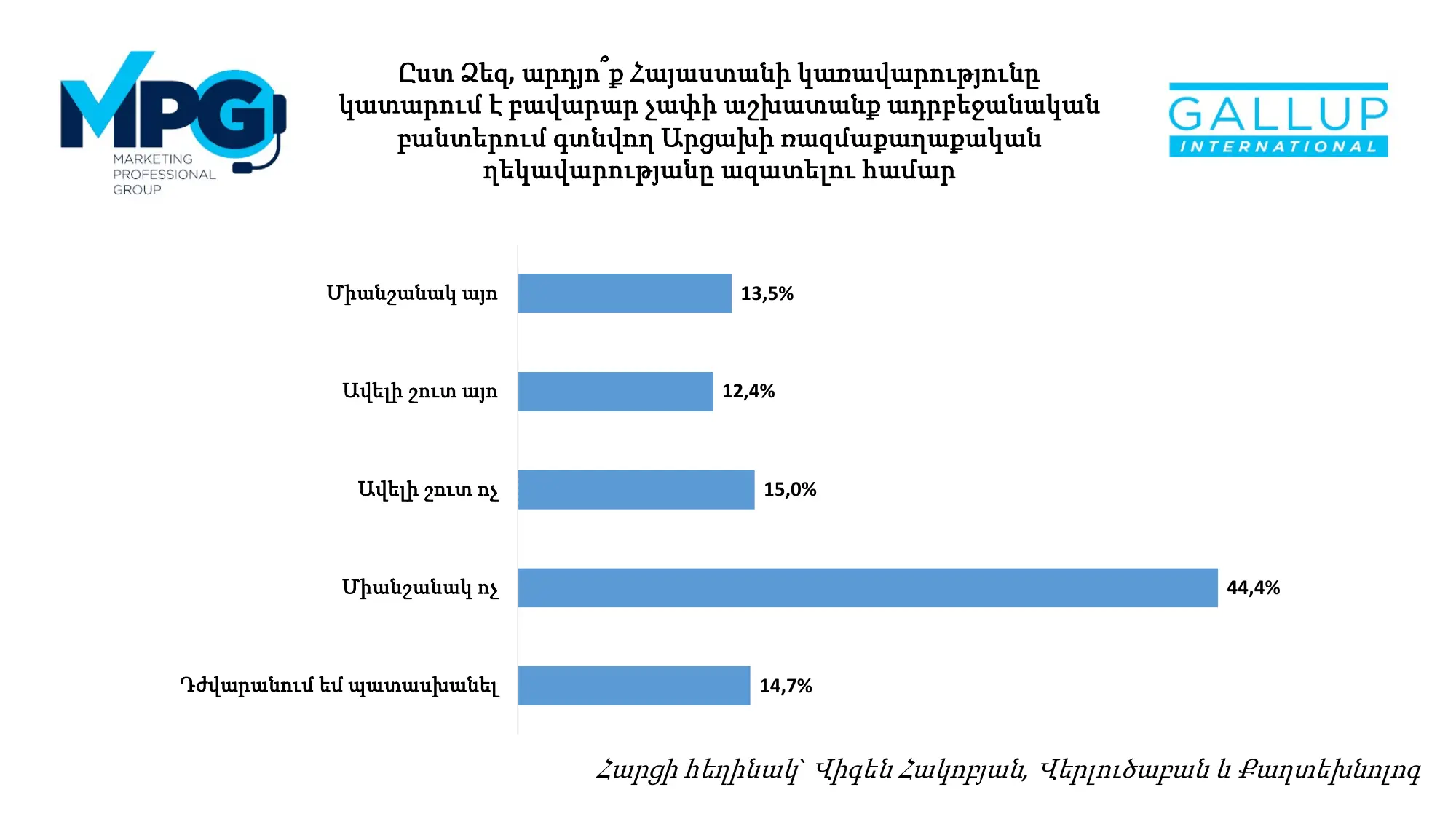
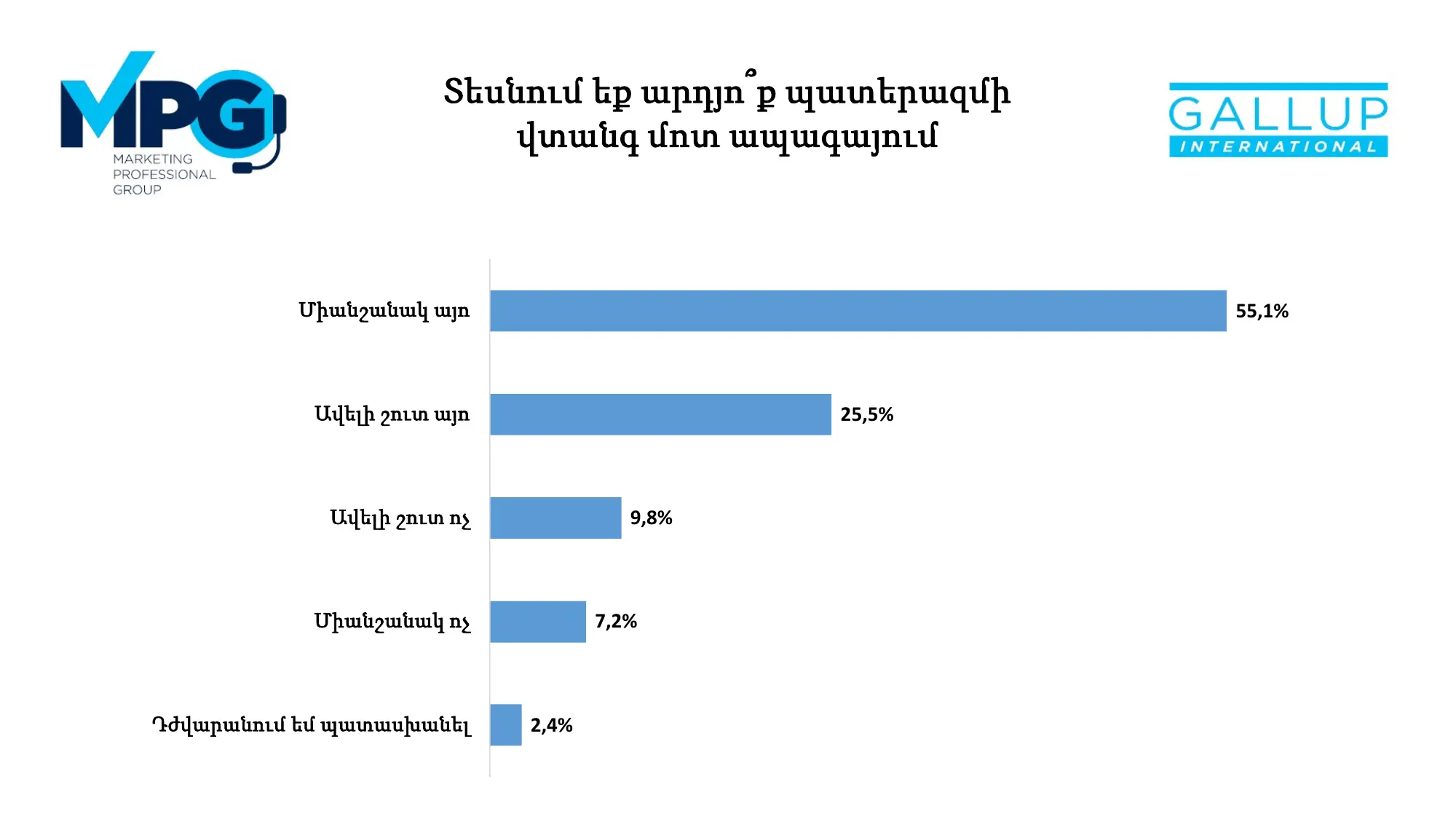
- 22% say NATO
- 28% say CSTO
- 44% say Armenia should stay “non-block”
Questions:
- Do Armenians have “block fatigue”? Really seems like Armenians are tired of thinking about security all day every day of their lives and just want the problem to go away. But does a “non-block” preference make the problems go away? Does “non-block” make Azerbaijan, or Turkey, go away?
Slide 6: Is the Armenian government doing enough to free the Artsakh leadership who are in prison in Baku?

- 26% say yes
- 60% say no
A 60% vote says Armenians want more done, to free the Artsakh leadership.
Slide 7: Is there risk of war in the near future?

- 81% say yes
- 17% say no
Slide 8: How are you disposed towards Armenia’s active military cooperation with France?

- 82% approve.
Questions:
- What’s there to not approve?
- We could skip this slide.
Slide 9: Which countries can Armenia expect military-political support from?

- 46% say France. Seems to be the partner due jour this poll around.
- 23% India
- 22% say Russia. Given how degraded the relations are, and level of anti-Russian propaganda on government media channels, it’s a surprise that Russia remains the third more trusted military-political ally.
- 16% say Iran
- 14% say the USA
- 5% say China
The fact that all the presumptive allies change from poll to poll, and their rankings are all over the place, testifies to how much public opinion is manipulated by the most popular media in Armenia, all of which are pro-government channels. The public opinion swings wildly from day to day, and week to week, as these channels pump people full of the government’s preferred agenda.
Russia has lost a lot of luster, but it retains a steady base of loyalists who trust the existing security architecture.
Slide 10: Was it right that on the 36th anniversary of the Artsakh movement, on February 20, the Armenian government did nothing to commemorate it?

- 61% say no, it was not right.
- 30% said yes, it was right to ignore the anniversary of the Karabakh Movement.
Slide 11: Is it acceptable for Armenia to leave the CSTO and EAEU as a “price” for a visa-free regime with the EU?
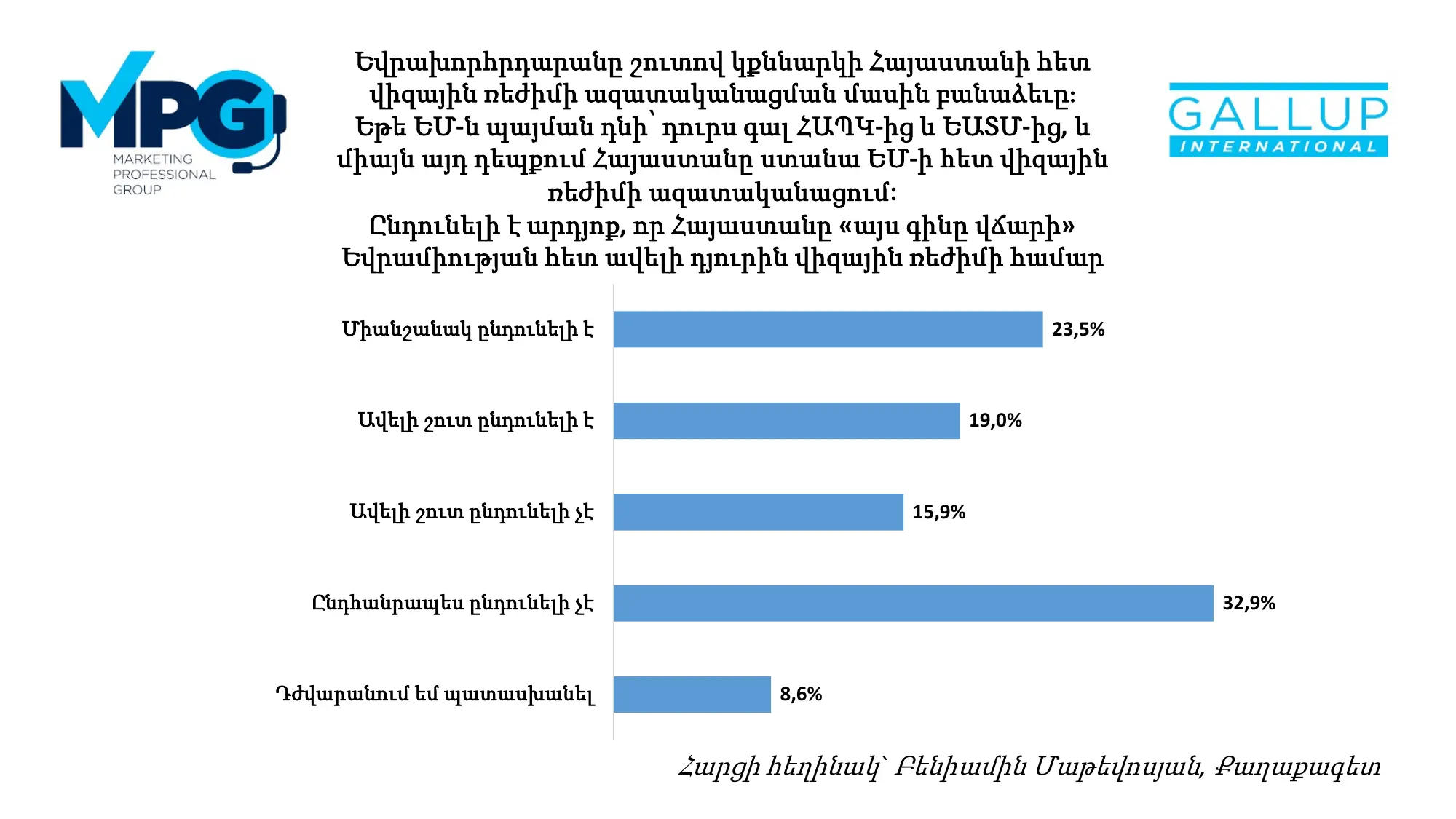
- 43% find it acceptable.
- 59% said no.
Even though a healthy majority of the people said no, it’s still disturbing to see that 43% of the respondents do not know which side their bread is buttered, and think it’s ok to give up its decades-long security system, and half of the Armenian economy, for the transient and rescindable privilege of simplified travel to Europe.
Guests
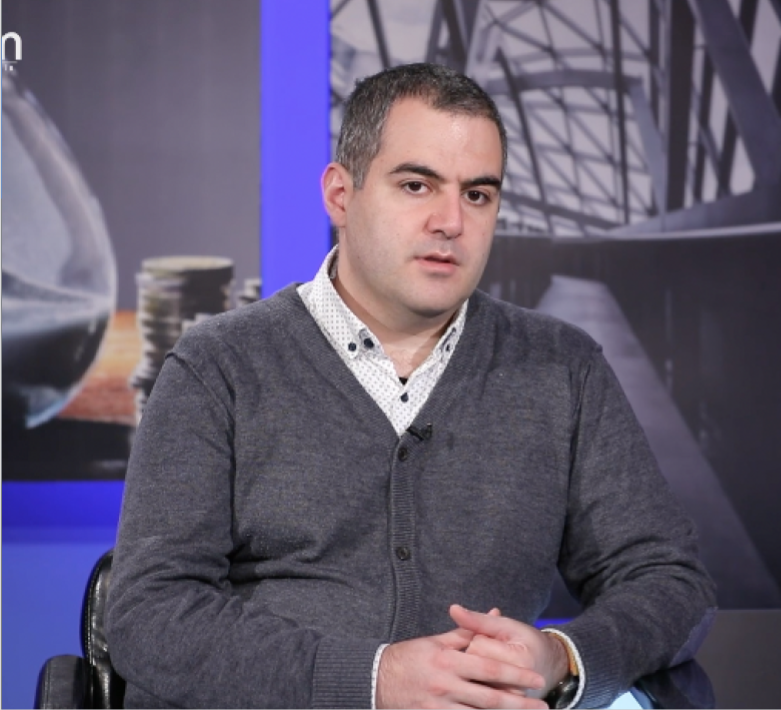
Hrant Mikaelian
Hrant Mikaelian, a political scientist and multidisciplinary researcher in social sciences based in Yerevan. He is also a senior researcher at the Caucasus Institute. Hrant is a co-founder of the Armenian Project.
Hosts

Asbed Bedrossian
Asbed Bedrossian is an IT professional, and for years oversaw the central IT enterprise infrastructure and services at USC. His decades of experience spanned across IT strategy, enterprise architecture, infrastructure, cybersecurity, enterprise applications, data center operations, high performance computing, ITSM, ITPM, and more.
Asbed founded the Armenian News Network Groong circa 1989/1990, and co-founded the ANN/Groong podcast in 2020.

Hovik Manucharyan
Hovik Manucharyan is an information security engineer who moved from Seattle to Armenia in 2022. He co-founded the ANN/Groong podcast in 2020 and has been a contributor to Groong News since the late 1990s.
Disclaimer: The views expressed by Hovik Manucharyan on the ANN/Groong podcast are his own and do not necessarily reflect the opinions of his employer or any other organization.